Expatriate Management Assignment PDF
VerifiedAdded on 2021/05/12
|31
|7497
|134
AI Summary
Contribute Materials
Your contribution can guide someone’s learning journey. Share your
documents today.
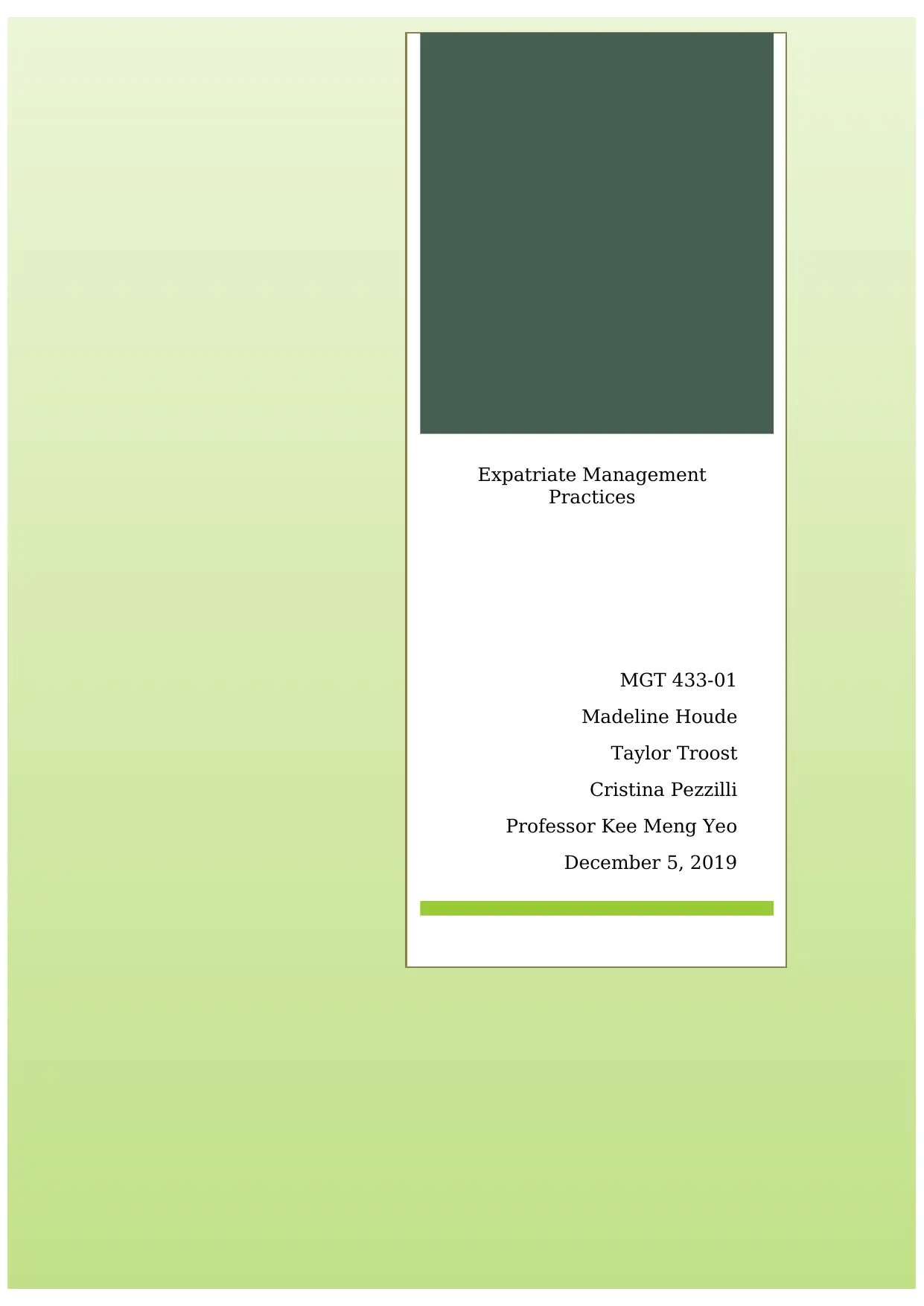
Expatriate Management
Practices
cri
MGT 433-01
Madeline Houde
Taylor Troost
Cristina Pezzilli
Professor Kee Meng Yeo
December 5, 2019
Practices
cri
MGT 433-01
Madeline Houde
Taylor Troost
Cristina Pezzilli
Professor Kee Meng Yeo
December 5, 2019
Secure Best Marks with AI Grader
Need help grading? Try our AI Grader for instant feedback on your assignments.
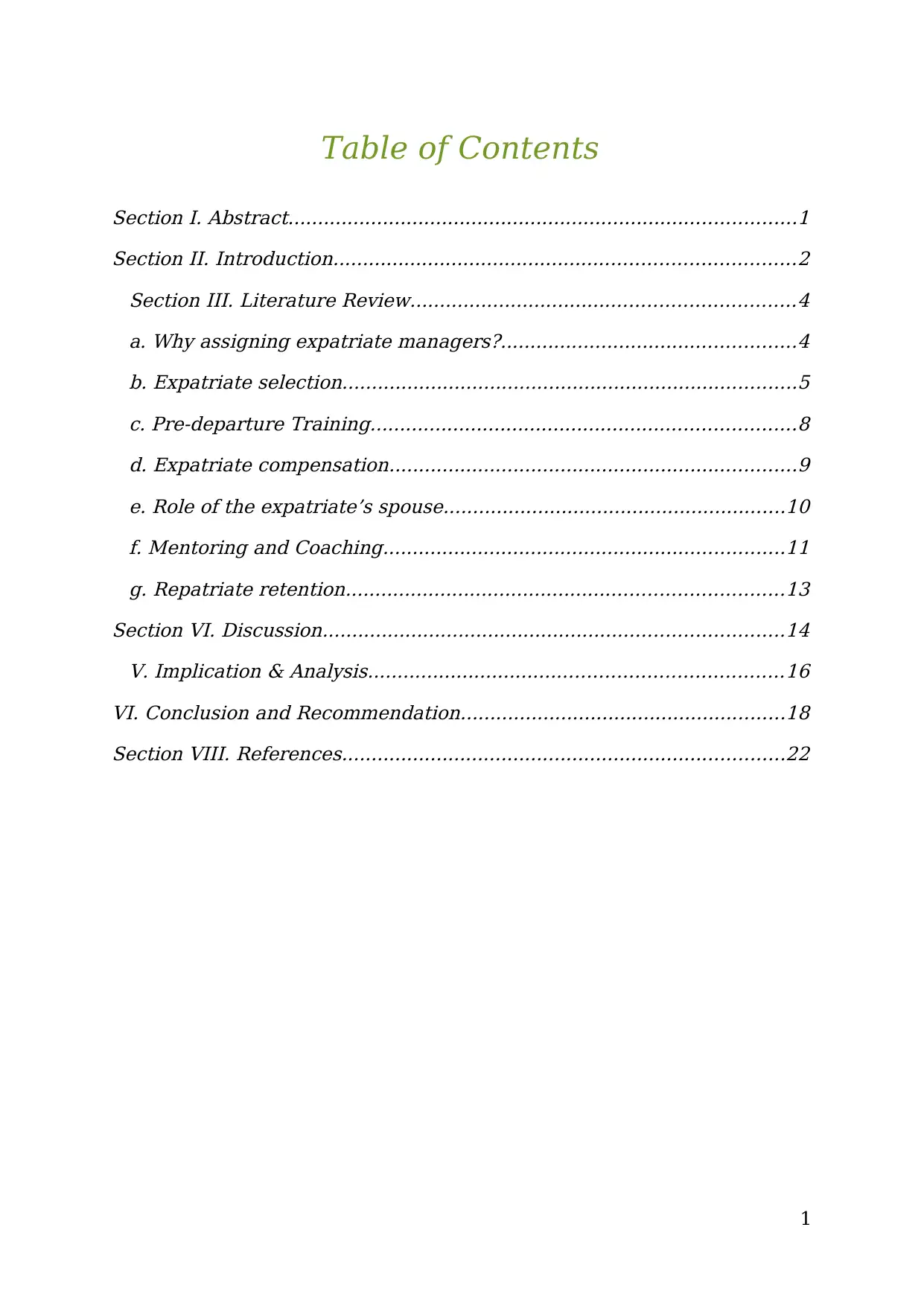
Table of Contents
Section I. Abstract......................................................................................1
Section II. Introduction..............................................................................2
Section III. Literature Review.................................................................4
a. Why assigning expatriate managers?..................................................4
b. Expatriate selection.............................................................................5
c. Pre-departure Training........................................................................8
d. Expatriate compensation.....................................................................9
e. Role of the expatriate’s spouse..........................................................10
f. Mentoring and Coaching....................................................................11
g. Repatriate retention..........................................................................13
Section VI. Discussion..............................................................................14
V. Implication & Analysis......................................................................16
VI. Conclusion and Recommendation.......................................................18
Section VIII. References...........................................................................22
1
Section I. Abstract......................................................................................1
Section II. Introduction..............................................................................2
Section III. Literature Review.................................................................4
a. Why assigning expatriate managers?..................................................4
b. Expatriate selection.............................................................................5
c. Pre-departure Training........................................................................8
d. Expatriate compensation.....................................................................9
e. Role of the expatriate’s spouse..........................................................10
f. Mentoring and Coaching....................................................................11
g. Repatriate retention..........................................................................13
Section VI. Discussion..............................................................................14
V. Implication & Analysis......................................................................16
VI. Conclusion and Recommendation.......................................................18
Section VIII. References...........................................................................22
1
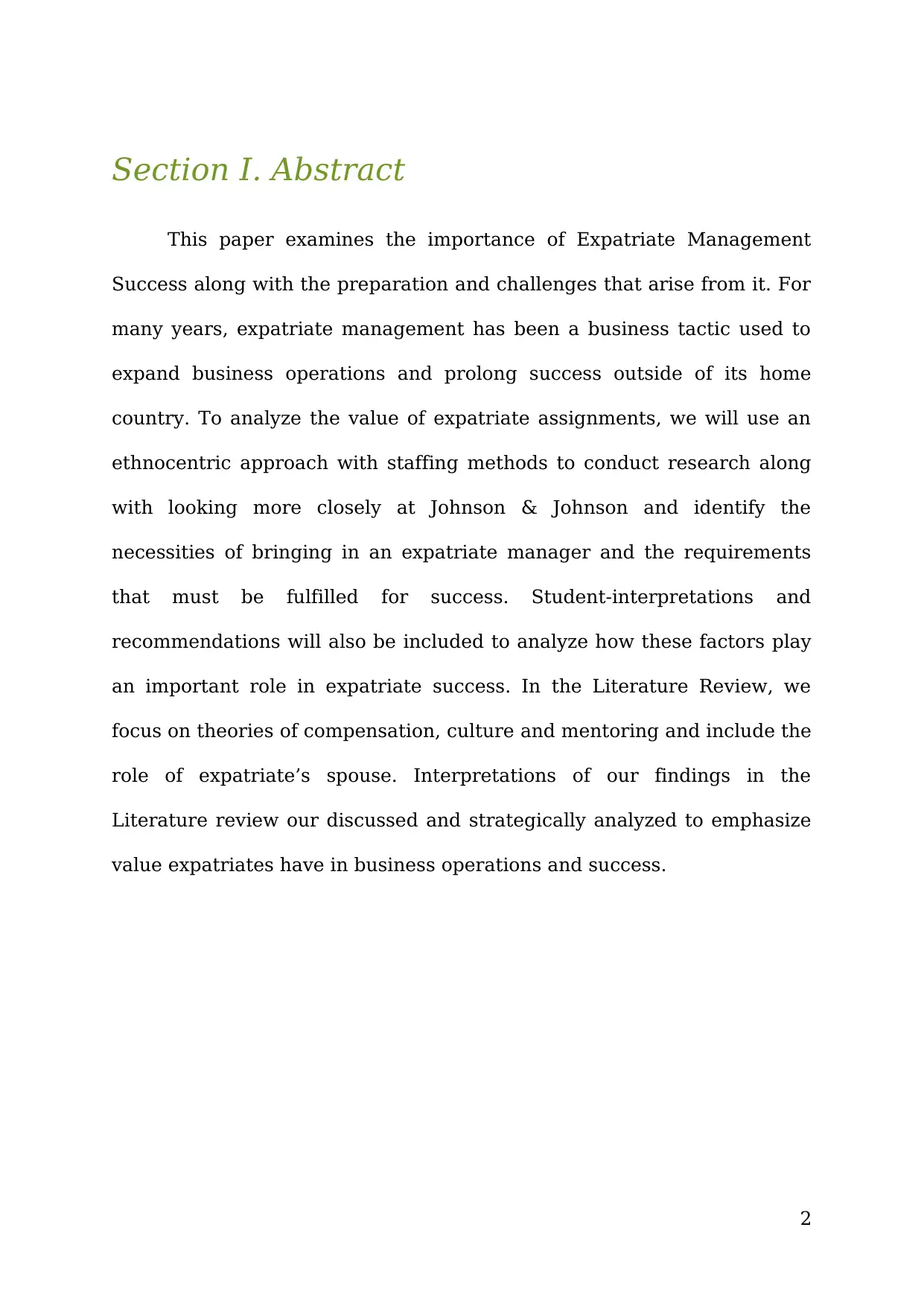
Section I. Abstract
This paper examines the importance of Expatriate Management
Success along with the preparation and challenges that arise from it. For
many years, expatriate management has been a business tactic used to
expand business operations and prolong success outside of its home
country. To analyze the value of expatriate assignments, we will use an
ethnocentric approach with staffing methods to conduct research along
with looking more closely at Johnson & Johnson and identify the
necessities of bringing in an expatriate manager and the requirements
that must be fulfilled for success. Student-interpretations and
recommendations will also be included to analyze how these factors play
an important role in expatriate success. In the Literature Review, we
focus on theories of compensation, culture and mentoring and include the
role of expatriate’s spouse. Interpretations of our findings in the
Literature review our discussed and strategically analyzed to emphasize
value expatriates have in business operations and success.
2
This paper examines the importance of Expatriate Management
Success along with the preparation and challenges that arise from it. For
many years, expatriate management has been a business tactic used to
expand business operations and prolong success outside of its home
country. To analyze the value of expatriate assignments, we will use an
ethnocentric approach with staffing methods to conduct research along
with looking more closely at Johnson & Johnson and identify the
necessities of bringing in an expatriate manager and the requirements
that must be fulfilled for success. Student-interpretations and
recommendations will also be included to analyze how these factors play
an important role in expatriate success. In the Literature Review, we
focus on theories of compensation, culture and mentoring and include the
role of expatriate’s spouse. Interpretations of our findings in the
Literature review our discussed and strategically analyzed to emphasize
value expatriates have in business operations and success.
2
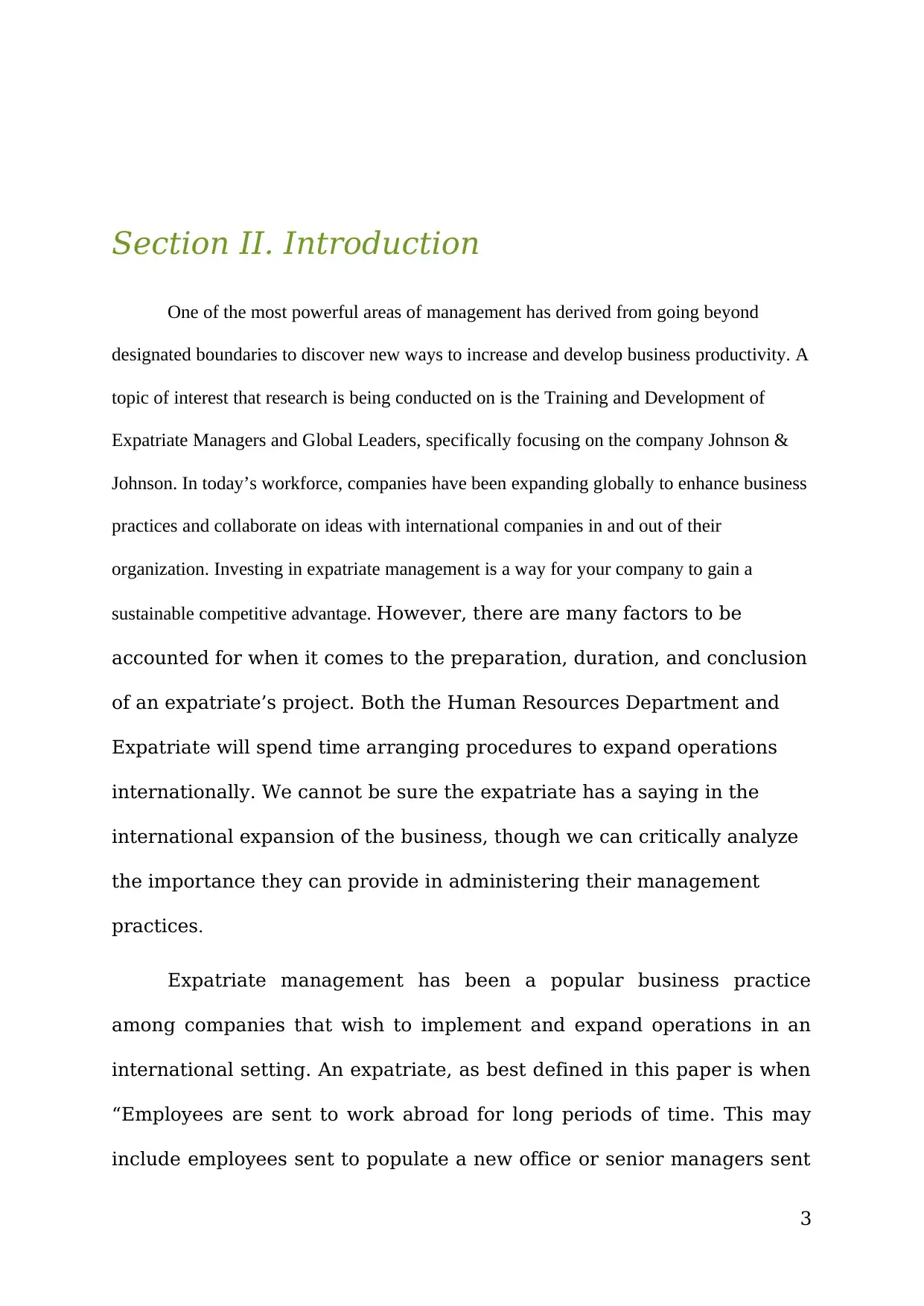
Section II. Introduction
One of the most powerful areas of management has derived from going beyond
designated boundaries to discover new ways to increase and develop business productivity. A
topic of interest that research is being conducted on is the Training and Development of
Expatriate Managers and Global Leaders, specifically focusing on the company Johnson &
Johnson. In today’s workforce, companies have been expanding globally to enhance business
practices and collaborate on ideas with international companies in and out of their
organization. Investing in expatriate management is a way for your company to gain a
sustainable competitive advantage. However, there are many factors to be
accounted for when it comes to the preparation, duration, and conclusion
of an expatriate’s project. Both the Human Resources Department and
Expatriate will spend time arranging procedures to expand operations
internationally. We cannot be sure the expatriate has a saying in the
international expansion of the business, though we can critically analyze
the importance they can provide in administering their management
practices.
Expatriate management has been a popular business practice
among companies that wish to implement and expand operations in an
international setting. An expatriate, as best defined in this paper is when
“Employees are sent to work abroad for long periods of time. This may
include employees sent to populate a new office or senior managers sent
3
One of the most powerful areas of management has derived from going beyond
designated boundaries to discover new ways to increase and develop business productivity. A
topic of interest that research is being conducted on is the Training and Development of
Expatriate Managers and Global Leaders, specifically focusing on the company Johnson &
Johnson. In today’s workforce, companies have been expanding globally to enhance business
practices and collaborate on ideas with international companies in and out of their
organization. Investing in expatriate management is a way for your company to gain a
sustainable competitive advantage. However, there are many factors to be
accounted for when it comes to the preparation, duration, and conclusion
of an expatriate’s project. Both the Human Resources Department and
Expatriate will spend time arranging procedures to expand operations
internationally. We cannot be sure the expatriate has a saying in the
international expansion of the business, though we can critically analyze
the importance they can provide in administering their management
practices.
Expatriate management has been a popular business practice
among companies that wish to implement and expand operations in an
international setting. An expatriate, as best defined in this paper is when
“Employees are sent to work abroad for long periods of time. This may
include employees sent to populate a new office or senior managers sent
3
Secure Best Marks with AI Grader
Need help grading? Try our AI Grader for instant feedback on your assignments.
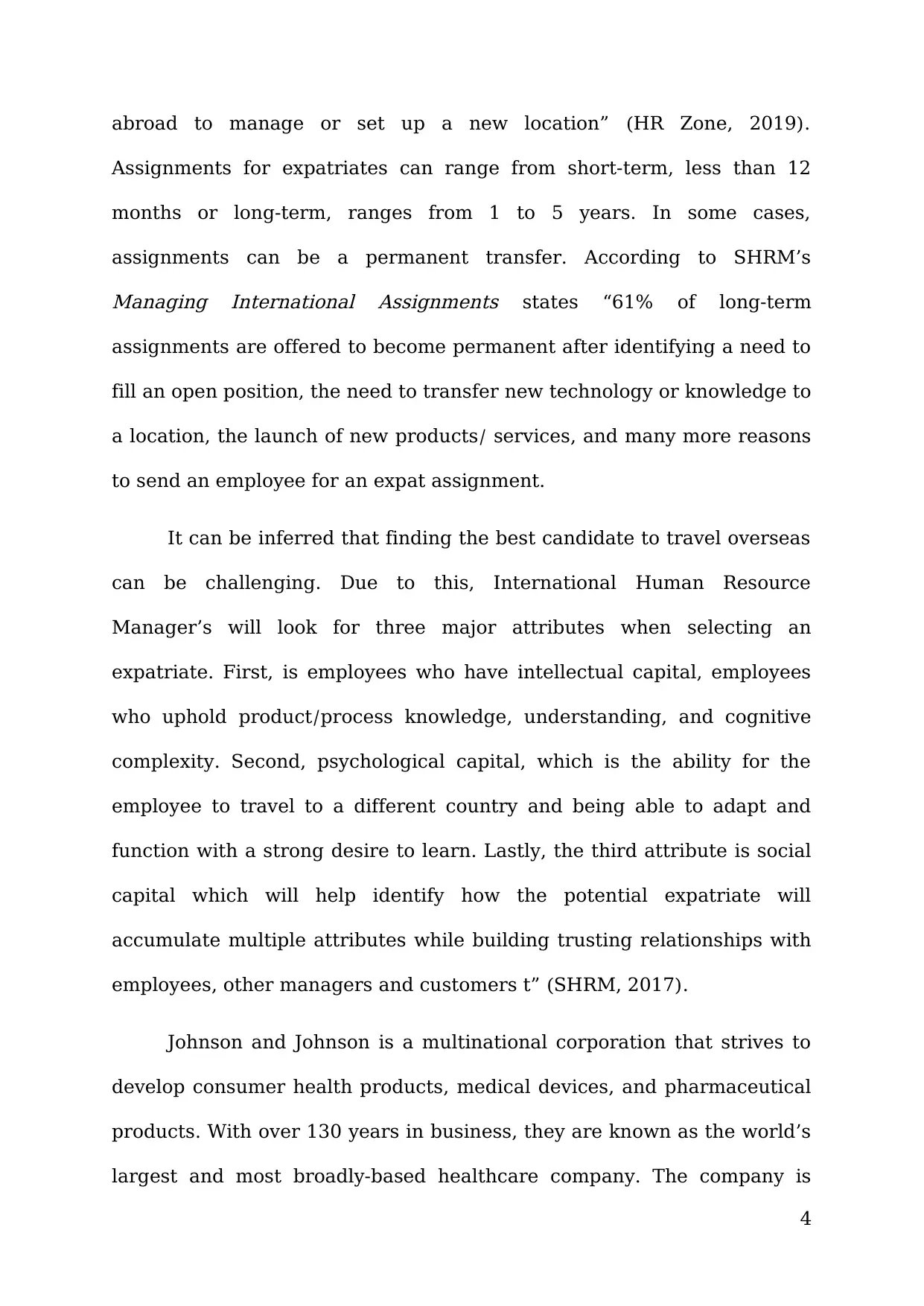
abroad to manage or set up a new location” (HR Zone, 2019).
Assignments for expatriates can range from short-term, less than 12
months or long-term, ranges from 1 to 5 years. In some cases,
assignments can be a permanent transfer. According to SHRM’s
Managing International Assignments states “61% of long-term
assignments are offered to become permanent after identifying a need to
fill an open position, the need to transfer new technology or knowledge to
a location, the launch of new products/ services, and many more reasons
to send an employee for an expat assignment.
It can be inferred that finding the best candidate to travel overseas
can be challenging. Due to this, International Human Resource
Manager’s will look for three major attributes when selecting an
expatriate. First, is employees who have intellectual capital, employees
who uphold product/process knowledge, understanding, and cognitive
complexity. Second, psychological capital, which is the ability for the
employee to travel to a different country and being able to adapt and
function with a strong desire to learn. Lastly, the third attribute is social
capital which will help identify how the potential expatriate will
accumulate multiple attributes while building trusting relationships with
employees, other managers and customers t” (SHRM, 2017).
Johnson and Johnson is a multinational corporation that strives to
develop consumer health products, medical devices, and pharmaceutical
products. With over 130 years in business, they are known as the world’s
largest and most broadly-based healthcare company. The company is
4
Assignments for expatriates can range from short-term, less than 12
months or long-term, ranges from 1 to 5 years. In some cases,
assignments can be a permanent transfer. According to SHRM’s
Managing International Assignments states “61% of long-term
assignments are offered to become permanent after identifying a need to
fill an open position, the need to transfer new technology or knowledge to
a location, the launch of new products/ services, and many more reasons
to send an employee for an expat assignment.
It can be inferred that finding the best candidate to travel overseas
can be challenging. Due to this, International Human Resource
Manager’s will look for three major attributes when selecting an
expatriate. First, is employees who have intellectual capital, employees
who uphold product/process knowledge, understanding, and cognitive
complexity. Second, psychological capital, which is the ability for the
employee to travel to a different country and being able to adapt and
function with a strong desire to learn. Lastly, the third attribute is social
capital which will help identify how the potential expatriate will
accumulate multiple attributes while building trusting relationships with
employees, other managers and customers t” (SHRM, 2017).
Johnson and Johnson is a multinational corporation that strives to
develop consumer health products, medical devices, and pharmaceutical
products. With over 130 years in business, they are known as the world’s
largest and most broadly-based healthcare company. The company is
4
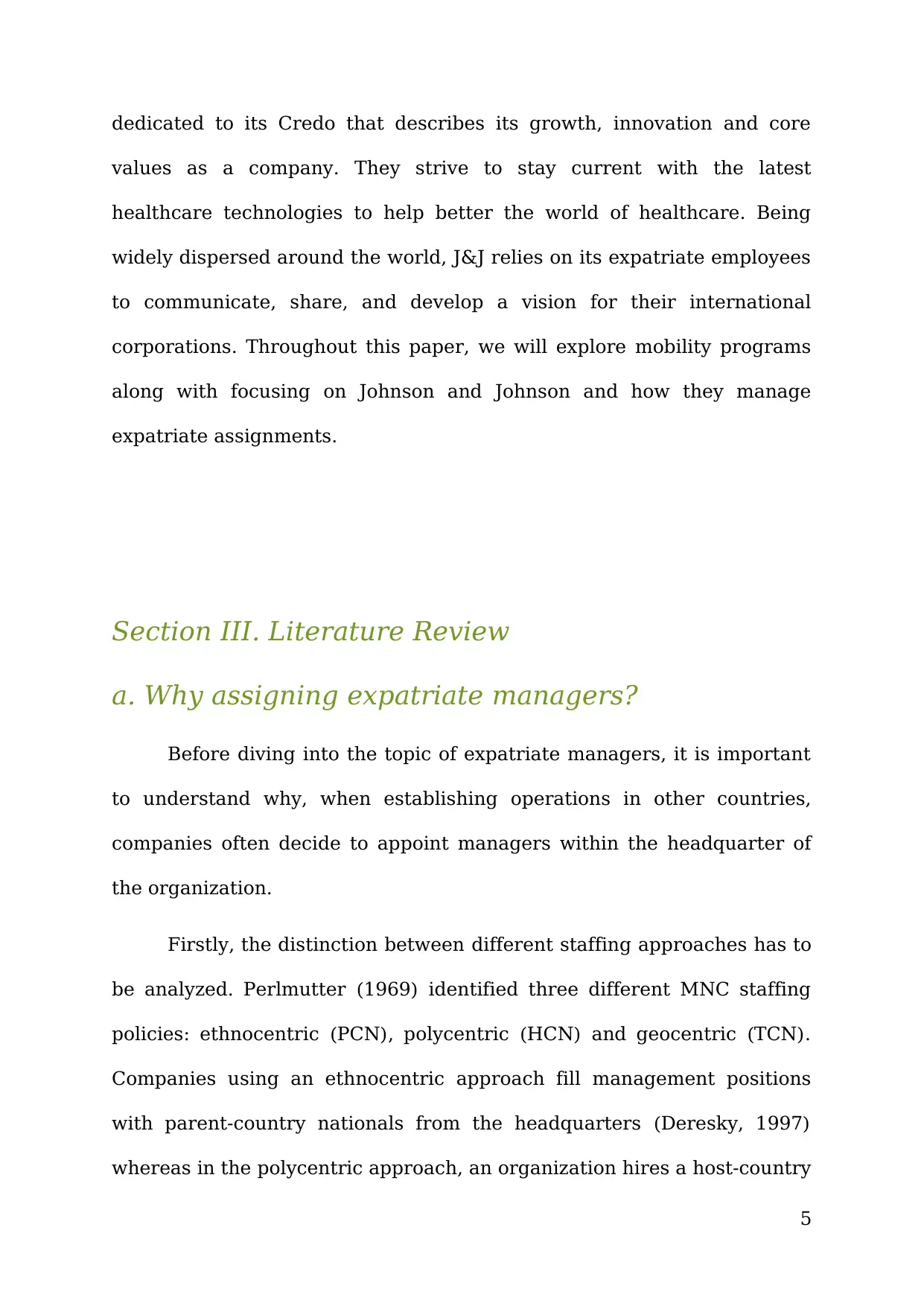
dedicated to its Credo that describes its growth, innovation and core
values as a company. They strive to stay current with the latest
healthcare technologies to help better the world of healthcare. Being
widely dispersed around the world, J&J relies on its expatriate employees
to communicate, share, and develop a vision for their international
corporations. Throughout this paper, we will explore mobility programs
along with focusing on Johnson and Johnson and how they manage
expatriate assignments.
Section III. Literature Review
a. Why assigning expatriate managers?
Before diving into the topic of expatriate managers, it is important
to understand why, when establishing operations in other countries,
companies often decide to appoint managers within the headquarter of
the organization.
Firstly, the distinction between different staffing approaches has to
be analyzed. Perlmutter (1969) identified three different MNC staffing
policies: ethnocentric (PCN), polycentric (HCN) and geocentric (TCN).
Companies using an ethnocentric approach fill management positions
with parent-country nationals from the headquarters (Deresky, 1997)
whereas in the polycentric approach, an organization hires a host-country
5
values as a company. They strive to stay current with the latest
healthcare technologies to help better the world of healthcare. Being
widely dispersed around the world, J&J relies on its expatriate employees
to communicate, share, and develop a vision for their international
corporations. Throughout this paper, we will explore mobility programs
along with focusing on Johnson and Johnson and how they manage
expatriate assignments.
Section III. Literature Review
a. Why assigning expatriate managers?
Before diving into the topic of expatriate managers, it is important
to understand why, when establishing operations in other countries,
companies often decide to appoint managers within the headquarter of
the organization.
Firstly, the distinction between different staffing approaches has to
be analyzed. Perlmutter (1969) identified three different MNC staffing
policies: ethnocentric (PCN), polycentric (HCN) and geocentric (TCN).
Companies using an ethnocentric approach fill management positions
with parent-country nationals from the headquarters (Deresky, 1997)
whereas in the polycentric approach, an organization hires a host-country
5
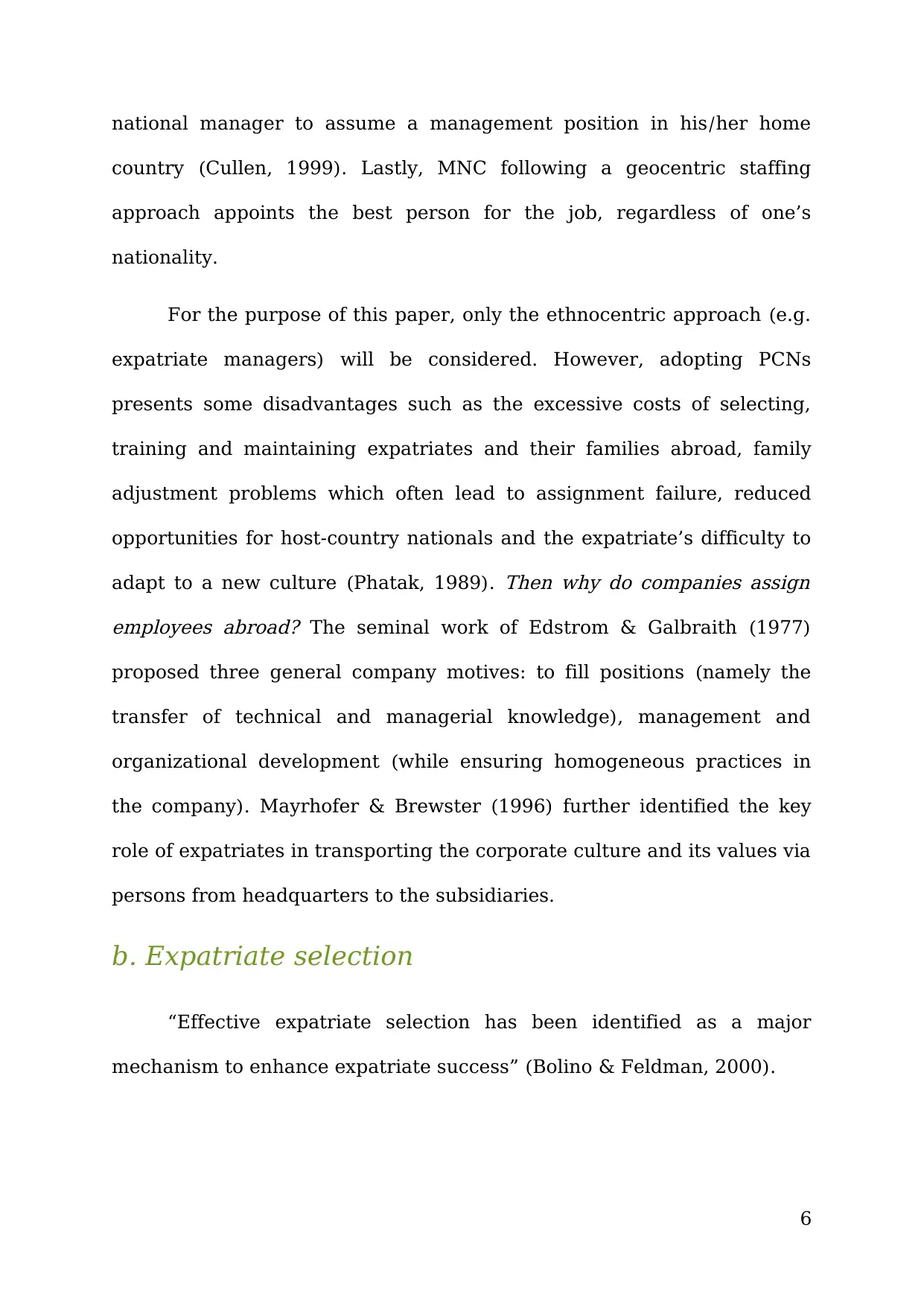
national manager to assume a management position in his/her home
country (Cullen, 1999). Lastly, MNC following a geocentric staffing
approach appoints the best person for the job, regardless of one’s
nationality.
For the purpose of this paper, only the ethnocentric approach (e.g.
expatriate managers) will be considered. However, adopting PCNs
presents some disadvantages such as the excessive costs of selecting,
training and maintaining expatriates and their families abroad, family
adjustment problems which often lead to assignment failure, reduced
opportunities for host-country nationals and the expatriate’s difficulty to
adapt to a new culture (Phatak, 1989).
Then why do companies assign
employees abroad? The seminal work of Edstrom & Galbraith (1977)
proposed three general company motives: to fill positions (namely the
transfer of technical and managerial knowledge), management and
organizational development (while ensuring homogeneous practices in
the company). Mayrhofer & Brewster (1996) further identified the key
role of expatriates in transporting the corporate culture and its values via
persons from headquarters to the subsidiaries.
b. Expatriate selection
“Effective expatriate selection has been identified as a major
mechanism to enhance expatriate success” (Bolino & Feldman, 2000).
6
country (Cullen, 1999). Lastly, MNC following a geocentric staffing
approach appoints the best person for the job, regardless of one’s
nationality.
For the purpose of this paper, only the ethnocentric approach (e.g.
expatriate managers) will be considered. However, adopting PCNs
presents some disadvantages such as the excessive costs of selecting,
training and maintaining expatriates and their families abroad, family
adjustment problems which often lead to assignment failure, reduced
opportunities for host-country nationals and the expatriate’s difficulty to
adapt to a new culture (Phatak, 1989).
Then why do companies assign
employees abroad? The seminal work of Edstrom & Galbraith (1977)
proposed three general company motives: to fill positions (namely the
transfer of technical and managerial knowledge), management and
organizational development (while ensuring homogeneous practices in
the company). Mayrhofer & Brewster (1996) further identified the key
role of expatriates in transporting the corporate culture and its values via
persons from headquarters to the subsidiaries.
b. Expatriate selection
“Effective expatriate selection has been identified as a major
mechanism to enhance expatriate success” (Bolino & Feldman, 2000).
6
Paraphrase This Document
Need a fresh take? Get an instant paraphrase of this document with our AI Paraphraser
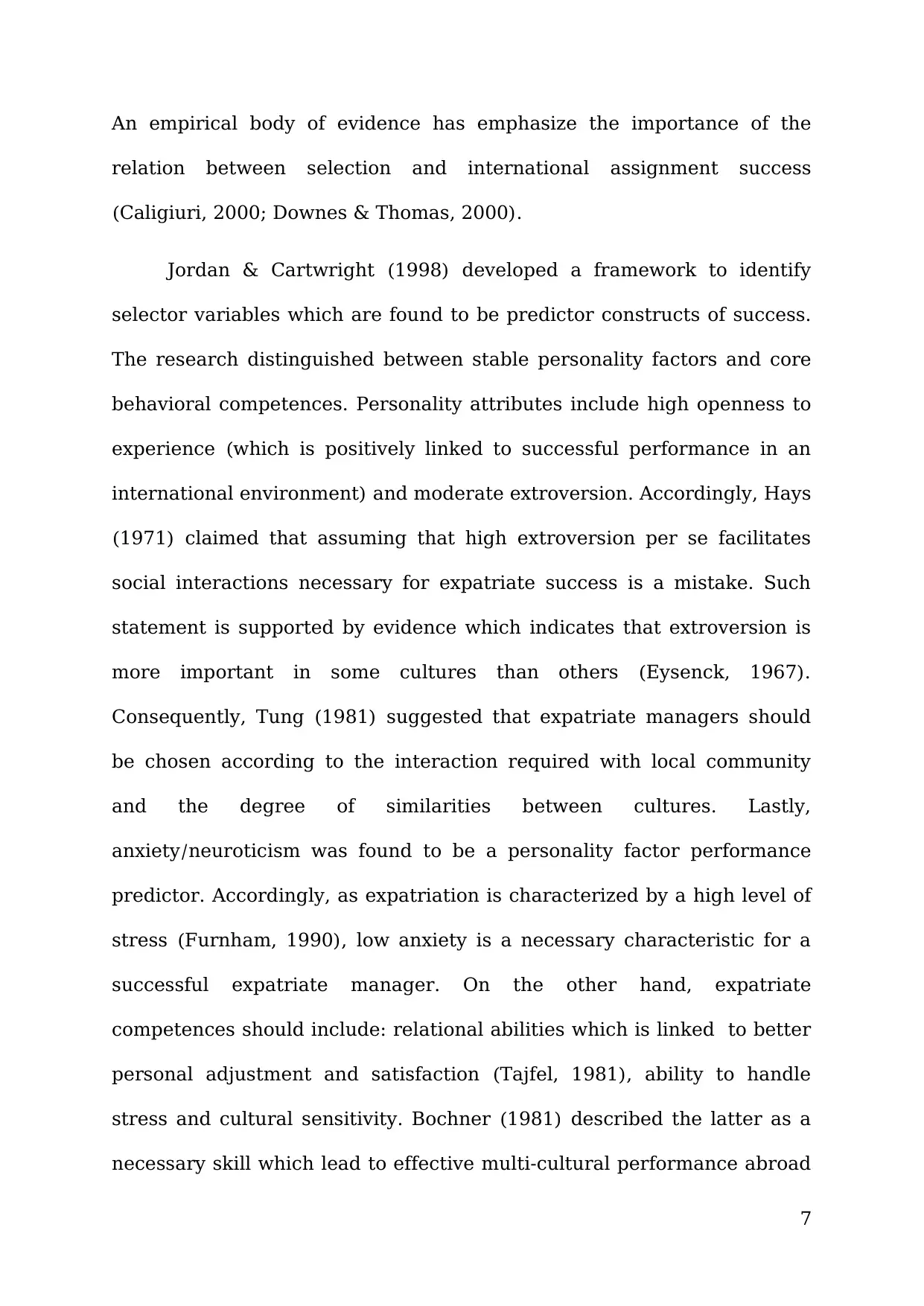
An empirical body of evidence has emphasize the importance of the
relation between selection and international assignment success
(Caligiuri, 2000; Downes & Thomas, 2000).
Jordan & Cartwright (1998) developed a framework to identify
selector variables which are found to be predictor constructs of success.
The research distinguished between stable personality factors and core
behavioral competences. Personality attributes include high openness to
experience (which is positively linked to successful performance in an
international environment) and moderate extroversion. Accordingly, Hays
(1971) claimed that assuming that high extroversion per se facilitates
social interactions necessary for expatriate success is a mistake. Such
statement is supported by evidence which indicates that extroversion is
more important in some cultures than others (Eysenck, 1967).
Consequently, Tung (1981) suggested that expatriate managers should
be chosen according to the interaction required with local community
and the degree of similarities between cultures. Lastly,
anxiety/neuroticism was found to be a personality factor performance
predictor. Accordingly, as expatriation is characterized by a high level of
stress (Furnham, 1990), low anxiety is a necessary characteristic for a
successful expatriate manager. On the other hand, expatriate
competences should include: relational abilities which is linked to better
personal adjustment and satisfaction (Tajfel, 1981), ability to handle
stress and cultural sensitivity. Bochner (1981) described the latter as a
necessary skill which lead to effective multi-cultural performance abroad
7
relation between selection and international assignment success
(Caligiuri, 2000; Downes & Thomas, 2000).
Jordan & Cartwright (1998) developed a framework to identify
selector variables which are found to be predictor constructs of success.
The research distinguished between stable personality factors and core
behavioral competences. Personality attributes include high openness to
experience (which is positively linked to successful performance in an
international environment) and moderate extroversion. Accordingly, Hays
(1971) claimed that assuming that high extroversion per se facilitates
social interactions necessary for expatriate success is a mistake. Such
statement is supported by evidence which indicates that extroversion is
more important in some cultures than others (Eysenck, 1967).
Consequently, Tung (1981) suggested that expatriate managers should
be chosen according to the interaction required with local community
and the degree of similarities between cultures. Lastly,
anxiety/neuroticism was found to be a personality factor performance
predictor. Accordingly, as expatriation is characterized by a high level of
stress (Furnham, 1990), low anxiety is a necessary characteristic for a
successful expatriate manager. On the other hand, expatriate
competences should include: relational abilities which is linked to better
personal adjustment and satisfaction (Tajfel, 1981), ability to handle
stress and cultural sensitivity. Bochner (1981) described the latter as a
necessary skill which lead to effective multi-cultural performance abroad
7
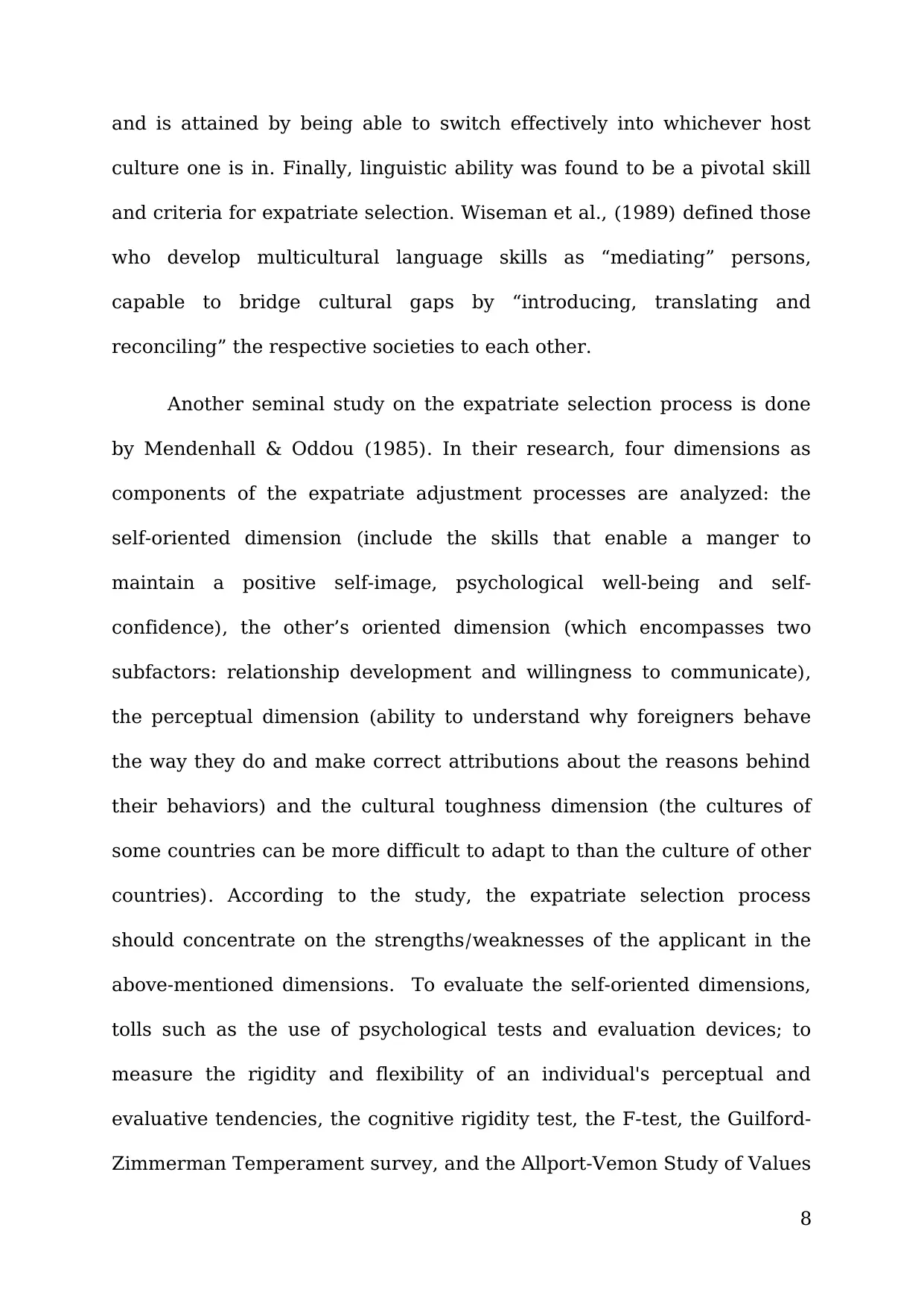
and is attained by being able to switch effectively into whichever host
culture one is in. Finally, linguistic ability was found to be a pivotal skill
and criteria for expatriate selection. Wiseman et al., (1989) defined those
who develop multicultural language skills as “mediating” persons,
capable to bridge cultural gaps by “introducing, translating and
reconciling” the respective societies to each other.
Another seminal study on the expatriate selection process is done
by Mendenhall & Oddou (1985). In their research, four dimensions as
components of the expatriate adjustment processes are analyzed: the
self-oriented dimension (include the skills that enable a manger to
maintain a positive self-image, psychological well-being and self-
confidence), the other’s oriented dimension (which encompasses two
subfactors: relationship development and willingness to communicate),
the perceptual dimension (ability to understand why foreigners behave
the way they do and make correct attributions about the reasons behind
their behaviors) and the cultural toughness dimension (the cultures of
some countries can be more difficult to adapt to than the culture of other
countries). According to the study, the expatriate selection process
should concentrate on the strengths/weaknesses of the applicant in the
above-mentioned dimensions. To evaluate the self-oriented dimensions,
tolls such as the use of psychological tests and evaluation devices; to
measure the rigidity and flexibility of an individual's perceptual and
evaluative tendencies, the cognitive rigidity test, the F-test, the Guilford-
Zimmerman Temperament survey, and the Allport-Vemon Study of Values
8
culture one is in. Finally, linguistic ability was found to be a pivotal skill
and criteria for expatriate selection. Wiseman et al., (1989) defined those
who develop multicultural language skills as “mediating” persons,
capable to bridge cultural gaps by “introducing, translating and
reconciling” the respective societies to each other.
Another seminal study on the expatriate selection process is done
by Mendenhall & Oddou (1985). In their research, four dimensions as
components of the expatriate adjustment processes are analyzed: the
self-oriented dimension (include the skills that enable a manger to
maintain a positive self-image, psychological well-being and self-
confidence), the other’s oriented dimension (which encompasses two
subfactors: relationship development and willingness to communicate),
the perceptual dimension (ability to understand why foreigners behave
the way they do and make correct attributions about the reasons behind
their behaviors) and the cultural toughness dimension (the cultures of
some countries can be more difficult to adapt to than the culture of other
countries). According to the study, the expatriate selection process
should concentrate on the strengths/weaknesses of the applicant in the
above-mentioned dimensions. To evaluate the self-oriented dimensions,
tolls such as the use of psychological tests and evaluation devices; to
measure the rigidity and flexibility of an individual's perceptual and
evaluative tendencies, the cognitive rigidity test, the F-test, the Guilford-
Zimmerman Temperament survey, and the Allport-Vemon Study of Values
8
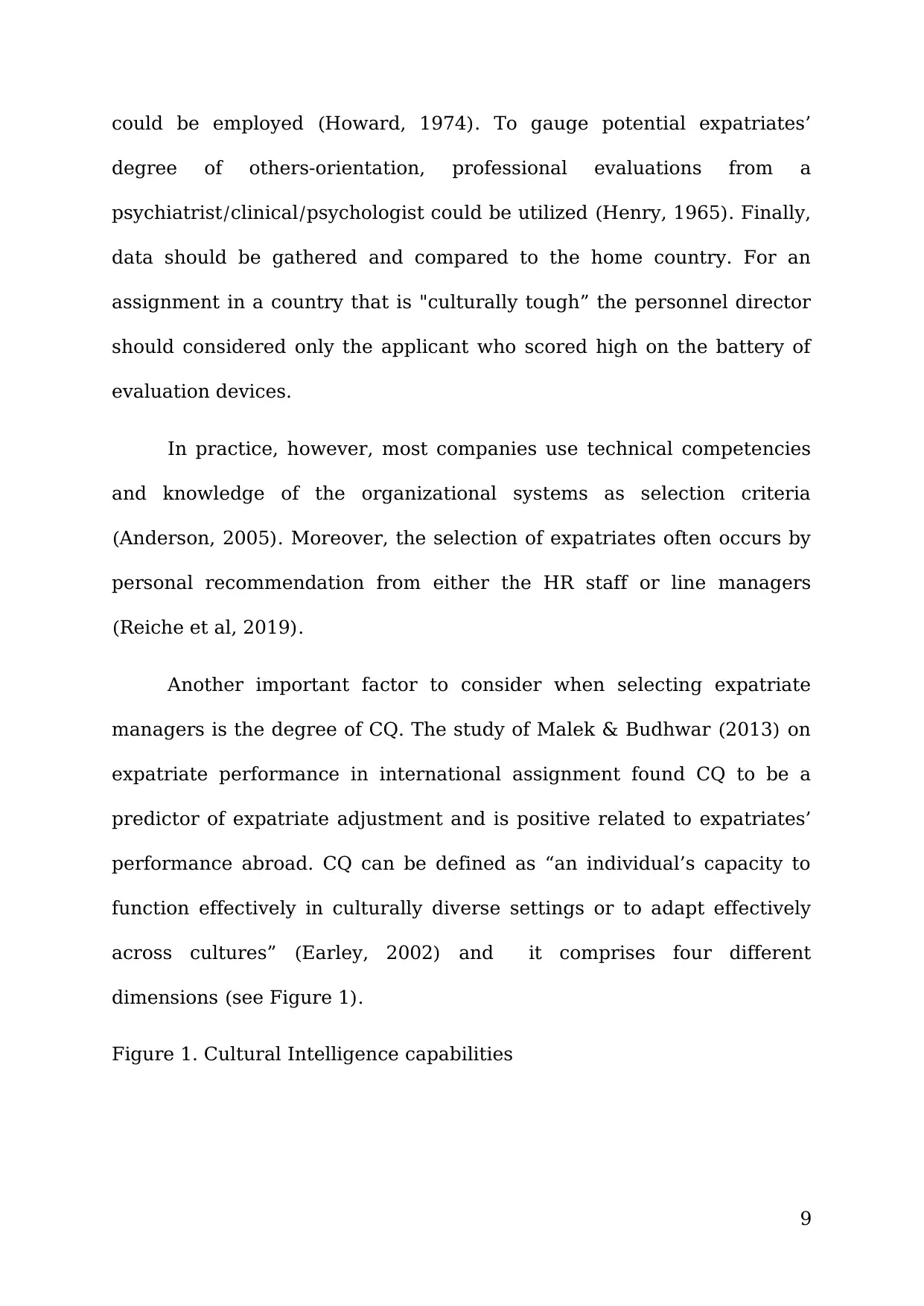
could be employed (Howard, 1974). To gauge potential expatriates’
degree of others-orientation, professional evaluations from a
psychiatrist/clinical/psychologist could be utilized (Henry, 1965). Finally,
data should be gathered and compared to the home country. For an
assignment in a country that is "culturally tough” the personnel director
should considered only the applicant who scored high on the battery of
evaluation devices.
In practice, however, most companies use technical competencies
and knowledge of the organizational systems as selection criteria
(Anderson, 2005). Moreover, the selection of expatriates often occurs by
personal recommendation from either the HR staff or line managers
(Reiche et al, 2019).
Another important factor to consider when selecting expatriate
managers is the degree of CQ. The study of Malek & Budhwar (2013) on
expatriate performance in international assignment found CQ to be a
predictor of expatriate adjustment and is positive related to expatriates’
performance abroad. CQ can be defined as “an individual’s capacity to
function effectively in culturally diverse settings or to adapt effectively
across cultures” (Earley, 2002) and it comprises four different
dimensions (see Figure 1).
Figure 1. Cultural Intelligence capabilities
9
degree of others-orientation, professional evaluations from a
psychiatrist/clinical/psychologist could be utilized (Henry, 1965). Finally,
data should be gathered and compared to the home country. For an
assignment in a country that is "culturally tough” the personnel director
should considered only the applicant who scored high on the battery of
evaluation devices.
In practice, however, most companies use technical competencies
and knowledge of the organizational systems as selection criteria
(Anderson, 2005). Moreover, the selection of expatriates often occurs by
personal recommendation from either the HR staff or line managers
(Reiche et al, 2019).
Another important factor to consider when selecting expatriate
managers is the degree of CQ. The study of Malek & Budhwar (2013) on
expatriate performance in international assignment found CQ to be a
predictor of expatriate adjustment and is positive related to expatriates’
performance abroad. CQ can be defined as “an individual’s capacity to
function effectively in culturally diverse settings or to adapt effectively
across cultures” (Earley, 2002) and it comprises four different
dimensions (see Figure 1).
Figure 1. Cultural Intelligence capabilities
9
Secure Best Marks with AI Grader
Need help grading? Try our AI Grader for instant feedback on your assignments.
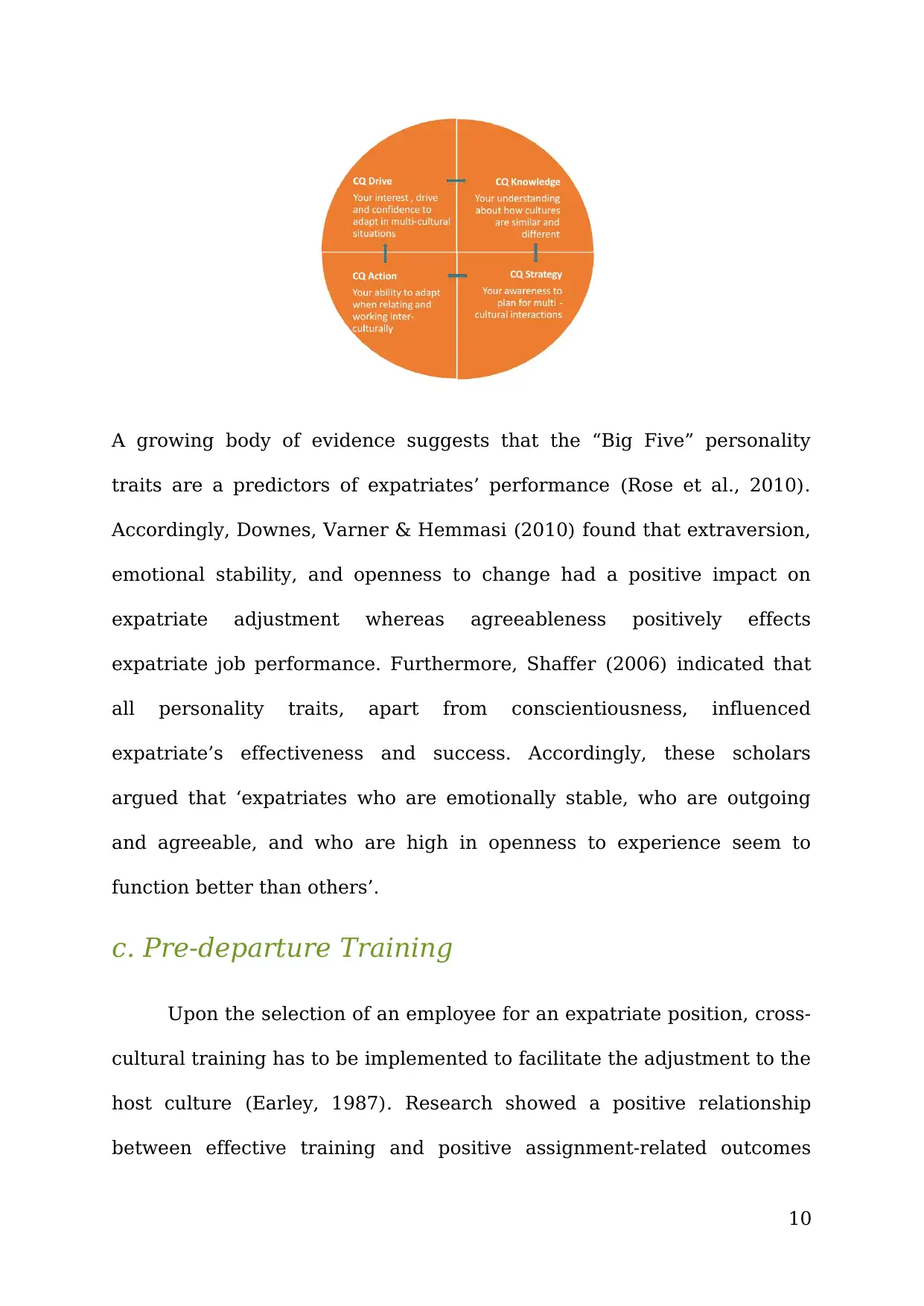
A growing body of evidence suggests that the “Big Five” personality
traits are a predictors of expatriates’ performance (Rose et al., 2010).
Accordingly, Downes, Varner & Hemmasi (2010) found that extraversion,
emotional stability, and openness to change had a positive impact on
expatriate adjustment whereas agreeableness positively effects
expatriate job performance. Furthermore, Shaffer (2006) indicated that
all personality traits, apart from conscientiousness, influenced
expatriate’s effectiveness and success. Accordingly, these scholars
argued that ‘expatriates who are emotionally stable, who are outgoing
and agreeable, and who are high in openness to experience seem to
function better than others’.
c. Pre-departure Training
Upon the selection of an employee for an expatriate position, cross-
cultural training has to be implemented to facilitate the adjustment to the
host culture (Earley, 1987). Research showed a positive relationship
between effective training and positive assignment-related outcomes
10
traits are a predictors of expatriates’ performance (Rose et al., 2010).
Accordingly, Downes, Varner & Hemmasi (2010) found that extraversion,
emotional stability, and openness to change had a positive impact on
expatriate adjustment whereas agreeableness positively effects
expatriate job performance. Furthermore, Shaffer (2006) indicated that
all personality traits, apart from conscientiousness, influenced
expatriate’s effectiveness and success. Accordingly, these scholars
argued that ‘expatriates who are emotionally stable, who are outgoing
and agreeable, and who are high in openness to experience seem to
function better than others’.
c. Pre-departure Training
Upon the selection of an employee for an expatriate position, cross-
cultural training has to be implemented to facilitate the adjustment to the
host culture (Earley, 1987). Research showed a positive relationship
between effective training and positive assignment-related outcomes
10
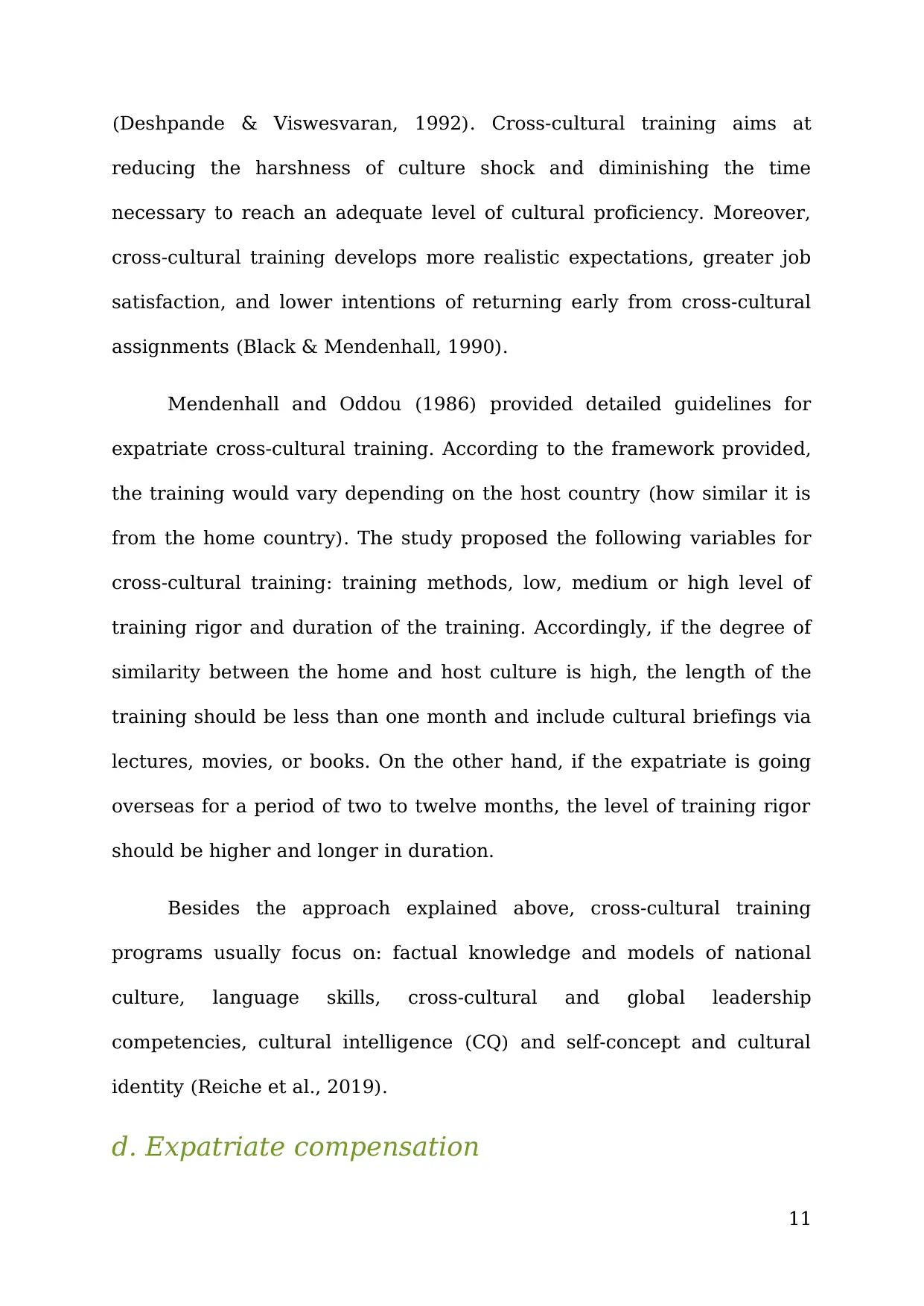
(Deshpande & Viswesvaran, 1992). Cross-cultural training aims at
reducing the harshness of culture shock and diminishing the time
necessary to reach an adequate level of cultural proficiency. Moreover,
cross-cultural training develops more realistic expectations, greater job
satisfaction, and lower intentions of returning early from cross-cultural
assignments (Black & Mendenhall, 1990).
Mendenhall and Oddou (1986) provided detailed guidelines for
expatriate cross-cultural training. According to the framework provided,
the training would vary depending on the host country (how similar it is
from the home country). The study proposed the following variables for
cross-cultural training: training methods, low, medium or high level of
training rigor and duration of the training. Accordingly, if the degree of
similarity between the home and host culture is high, the length of the
training should be less than one month and include cultural briefings via
lectures, movies, or books. On the other hand, if the expatriate is going
overseas for a period of two to twelve months, the level of training rigor
should be higher and longer in duration.
Besides the approach explained above, cross-cultural training
programs usually focus on: factual knowledge and models of national
culture, language skills, cross-cultural and global leadership
competencies, cultural intelligence (CQ) and self-concept and cultural
identity (Reiche et al., 2019).
d. Expatriate compensation
11
reducing the harshness of culture shock and diminishing the time
necessary to reach an adequate level of cultural proficiency. Moreover,
cross-cultural training develops more realistic expectations, greater job
satisfaction, and lower intentions of returning early from cross-cultural
assignments (Black & Mendenhall, 1990).
Mendenhall and Oddou (1986) provided detailed guidelines for
expatriate cross-cultural training. According to the framework provided,
the training would vary depending on the host country (how similar it is
from the home country). The study proposed the following variables for
cross-cultural training: training methods, low, medium or high level of
training rigor and duration of the training. Accordingly, if the degree of
similarity between the home and host culture is high, the length of the
training should be less than one month and include cultural briefings via
lectures, movies, or books. On the other hand, if the expatriate is going
overseas for a period of two to twelve months, the level of training rigor
should be higher and longer in duration.
Besides the approach explained above, cross-cultural training
programs usually focus on: factual knowledge and models of national
culture, language skills, cross-cultural and global leadership
competencies, cultural intelligence (CQ) and self-concept and cultural
identity (Reiche et al., 2019).
d. Expatriate compensation
11
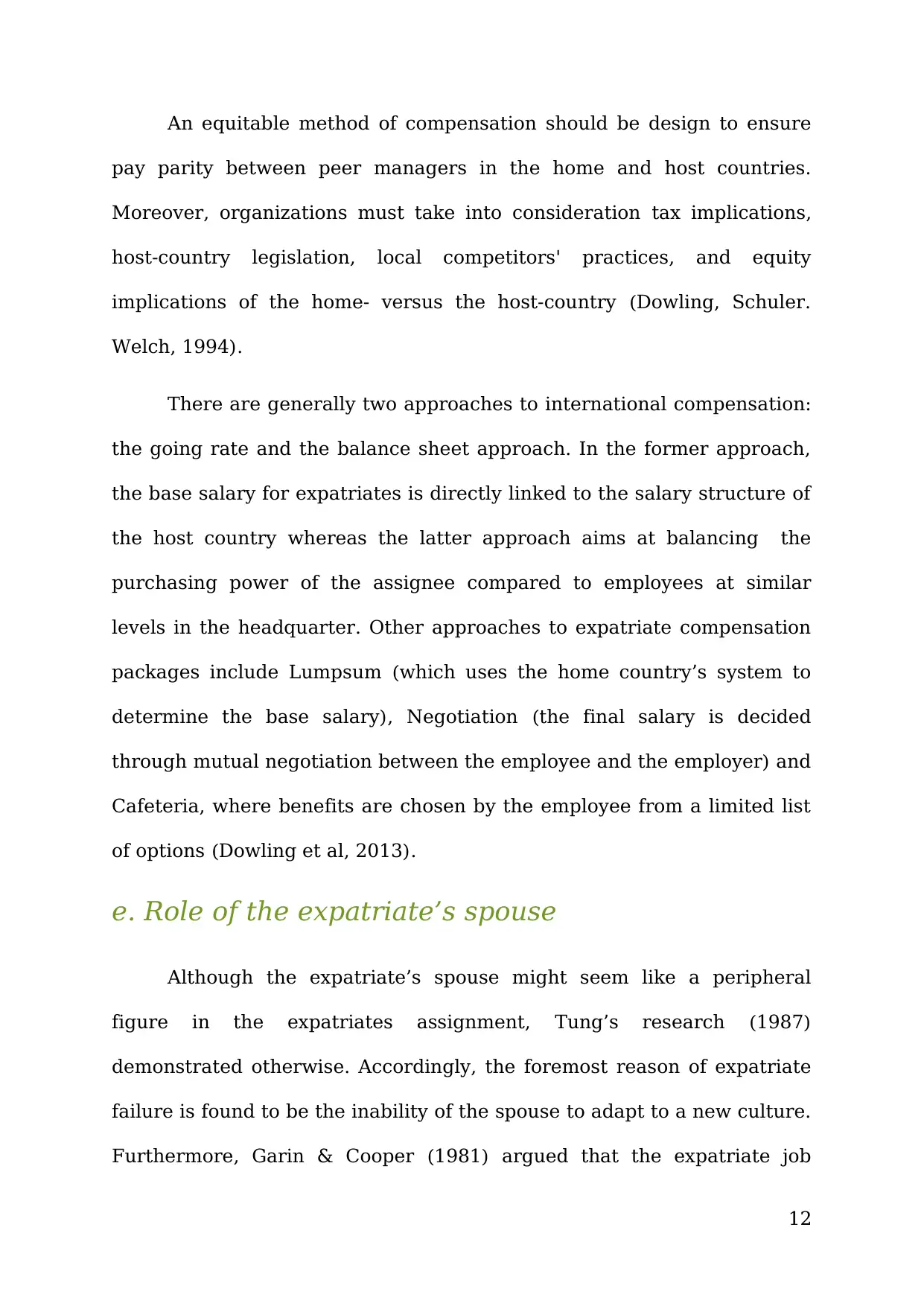
An equitable method of compensation should be design to ensure
pay parity between peer managers in the home and host countries.
Moreover, organizations must take into consideration tax implications,
host-country legislation, local competitors' practices, and equity
implications of the home- versus the host-country (Dowling, Schuler.
Welch, 1994).
There are generally two approaches to international compensation:
the going rate and the balance sheet approach. In the former approach,
the base salary for expatriates is directly linked to the salary structure of
the host country whereas the latter approach aims at balancing the
purchasing power of the assignee compared to employees at similar
levels in the headquarter. Other approaches to expatriate compensation
packages include Lumpsum (which uses the home country’s system to
determine the base salary), Negotiation (the final salary is decided
through mutual negotiation between the employee and the employer) and
Cafeteria, where benefits are chosen by the employee from a limited list
of options (Dowling et al, 2013).
e. Role of the expatriate’s spouse
Although the expatriate’s spouse might seem like a peripheral
figure in the expatriates assignment, Tung’s research (1987)
demonstrated otherwise. Accordingly, the foremost reason of expatriate
failure is found to be the inability of the spouse to adapt to a new culture.
Furthermore, Garin & Cooper (1981) argued that the expatriate job
12
pay parity between peer managers in the home and host countries.
Moreover, organizations must take into consideration tax implications,
host-country legislation, local competitors' practices, and equity
implications of the home- versus the host-country (Dowling, Schuler.
Welch, 1994).
There are generally two approaches to international compensation:
the going rate and the balance sheet approach. In the former approach,
the base salary for expatriates is directly linked to the salary structure of
the host country whereas the latter approach aims at balancing the
purchasing power of the assignee compared to employees at similar
levels in the headquarter. Other approaches to expatriate compensation
packages include Lumpsum (which uses the home country’s system to
determine the base salary), Negotiation (the final salary is decided
through mutual negotiation between the employee and the employer) and
Cafeteria, where benefits are chosen by the employee from a limited list
of options (Dowling et al, 2013).
e. Role of the expatriate’s spouse
Although the expatriate’s spouse might seem like a peripheral
figure in the expatriates assignment, Tung’s research (1987)
demonstrated otherwise. Accordingly, the foremost reason of expatriate
failure is found to be the inability of the spouse to adapt to a new culture.
Furthermore, Garin & Cooper (1981) argued that the expatriate job
12
Paraphrase This Document
Need a fresh take? Get an instant paraphrase of this document with our AI Paraphraser
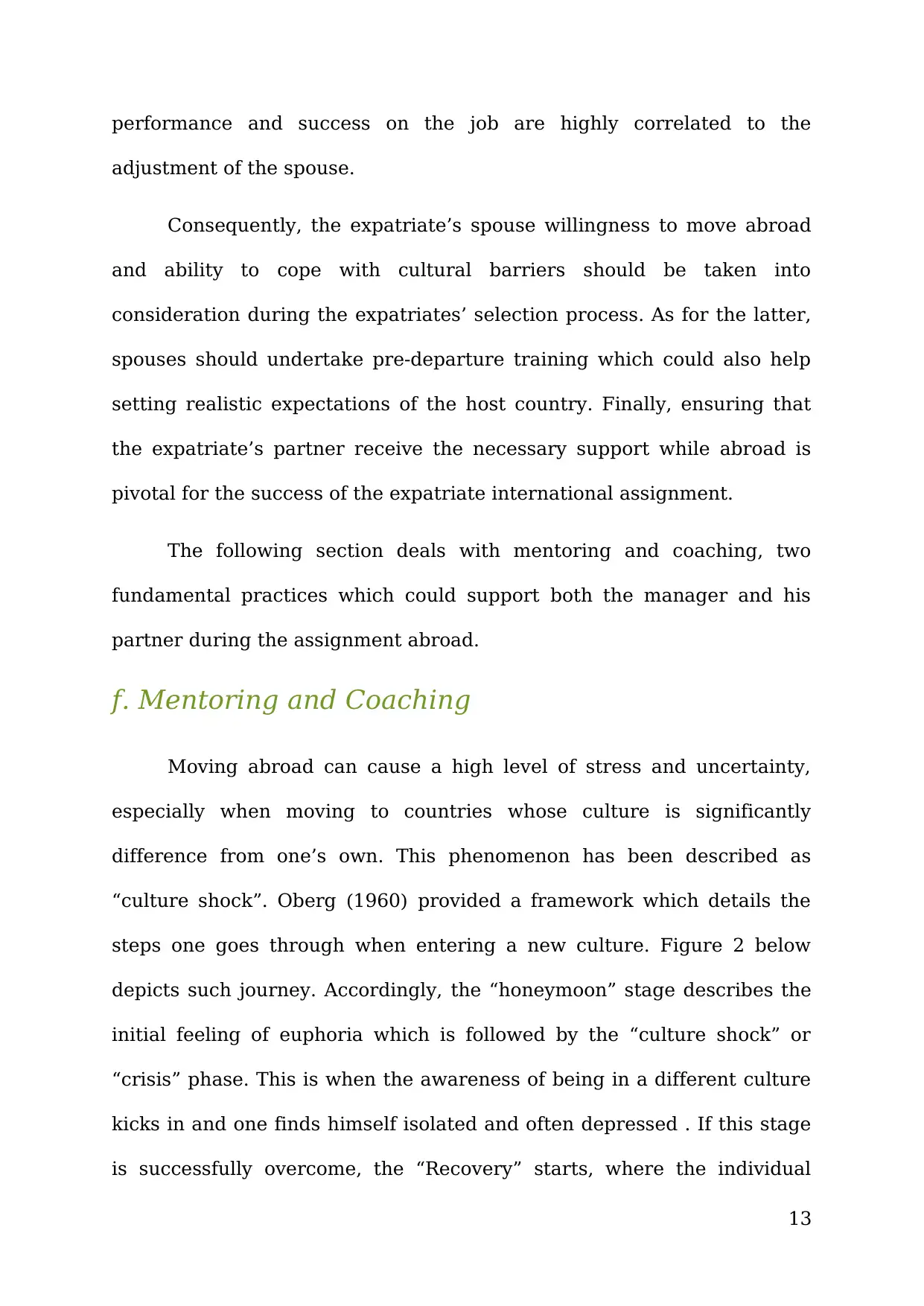
performance and success on the job are highly correlated to the
adjustment of the spouse.
Consequently, the expatriate’s spouse willingness to move abroad
and ability to cope with cultural barriers should be taken into
consideration during the expatriates’ selection process. As for the latter,
spouses should undertake pre-departure training which could also help
setting realistic expectations of the host country. Finally, ensuring that
the expatriate’s partner receive the necessary support while abroad is
pivotal for the success of the expatriate international assignment.
The following section deals with mentoring and coaching, two
fundamental practices which could support both the manager and his
partner during the assignment abroad.
f. Mentoring and Coaching
Moving abroad can cause a high level of stress and uncertainty,
especially when moving to countries whose culture is significantly
difference from one’s own. This phenomenon has been described as
“culture shock”. Oberg (1960) provided a framework which details the
steps one goes through when entering a new culture. Figure 2 below
depicts such journey. Accordingly, the “honeymoon” stage describes the
initial feeling of euphoria which is followed by the “culture shock” or
“crisis” phase. This is when the awareness of being in a different culture
kicks in and one finds himself isolated and often depressed . If this stage
is successfully overcome, the “Recovery” starts, where the individual
13
adjustment of the spouse.
Consequently, the expatriate’s spouse willingness to move abroad
and ability to cope with cultural barriers should be taken into
consideration during the expatriates’ selection process. As for the latter,
spouses should undertake pre-departure training which could also help
setting realistic expectations of the host country. Finally, ensuring that
the expatriate’s partner receive the necessary support while abroad is
pivotal for the success of the expatriate international assignment.
The following section deals with mentoring and coaching, two
fundamental practices which could support both the manager and his
partner during the assignment abroad.
f. Mentoring and Coaching
Moving abroad can cause a high level of stress and uncertainty,
especially when moving to countries whose culture is significantly
difference from one’s own. This phenomenon has been described as
“culture shock”. Oberg (1960) provided a framework which details the
steps one goes through when entering a new culture. Figure 2 below
depicts such journey. Accordingly, the “honeymoon” stage describes the
initial feeling of euphoria which is followed by the “culture shock” or
“crisis” phase. This is when the awareness of being in a different culture
kicks in and one finds himself isolated and often depressed . If this stage
is successfully overcome, the “Recovery” starts, where the individual
13
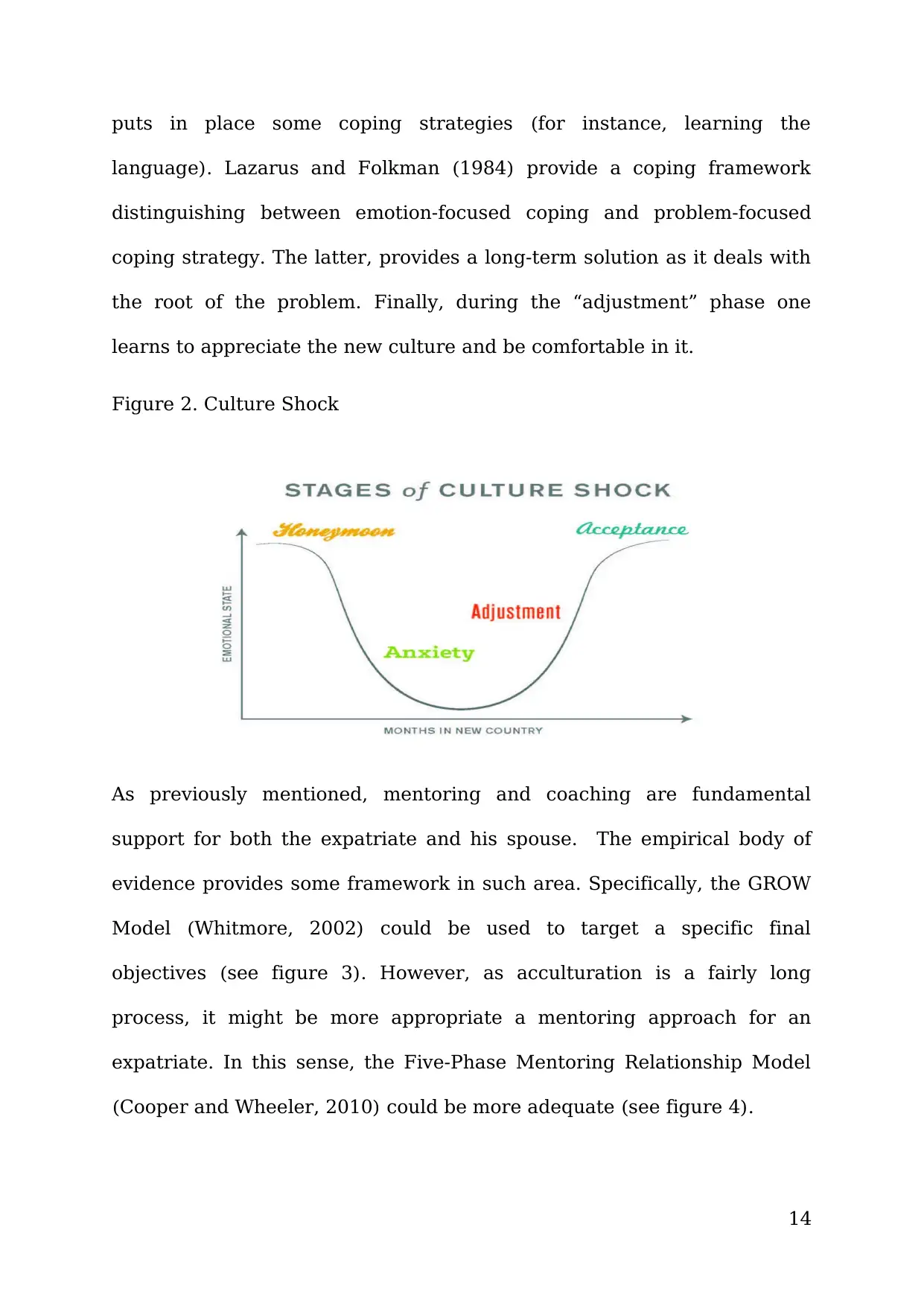
puts in place some coping strategies (for instance, learning the
language). Lazarus and Folkman (1984) provide a coping framework
distinguishing between emotion-focused coping and problem-focused
coping strategy. The latter, provides a long-term solution as it deals with
the root of the problem. Finally, during the “adjustment” phase one
learns to appreciate the new culture and be comfortable in it.
Figure 2. Culture Shock
As previously mentioned, mentoring and coaching are fundamental
support for both the expatriate and his spouse. The empirical body of
evidence provides some framework in such area. Specifically, the GROW
Model (Whitmore, 2002) could be used to target a specific final
objectives (see figure 3). However, as acculturation is a fairly long
process, it might be more appropriate a mentoring approach for an
expatriate. In this sense, the Five-Phase Mentoring Relationship Model
(Cooper and Wheeler, 2010) could be more adequate (see figure 4).
14
language). Lazarus and Folkman (1984) provide a coping framework
distinguishing between emotion-focused coping and problem-focused
coping strategy. The latter, provides a long-term solution as it deals with
the root of the problem. Finally, during the “adjustment” phase one
learns to appreciate the new culture and be comfortable in it.
Figure 2. Culture Shock
As previously mentioned, mentoring and coaching are fundamental
support for both the expatriate and his spouse. The empirical body of
evidence provides some framework in such area. Specifically, the GROW
Model (Whitmore, 2002) could be used to target a specific final
objectives (see figure 3). However, as acculturation is a fairly long
process, it might be more appropriate a mentoring approach for an
expatriate. In this sense, the Five-Phase Mentoring Relationship Model
(Cooper and Wheeler, 2010) could be more adequate (see figure 4).
14
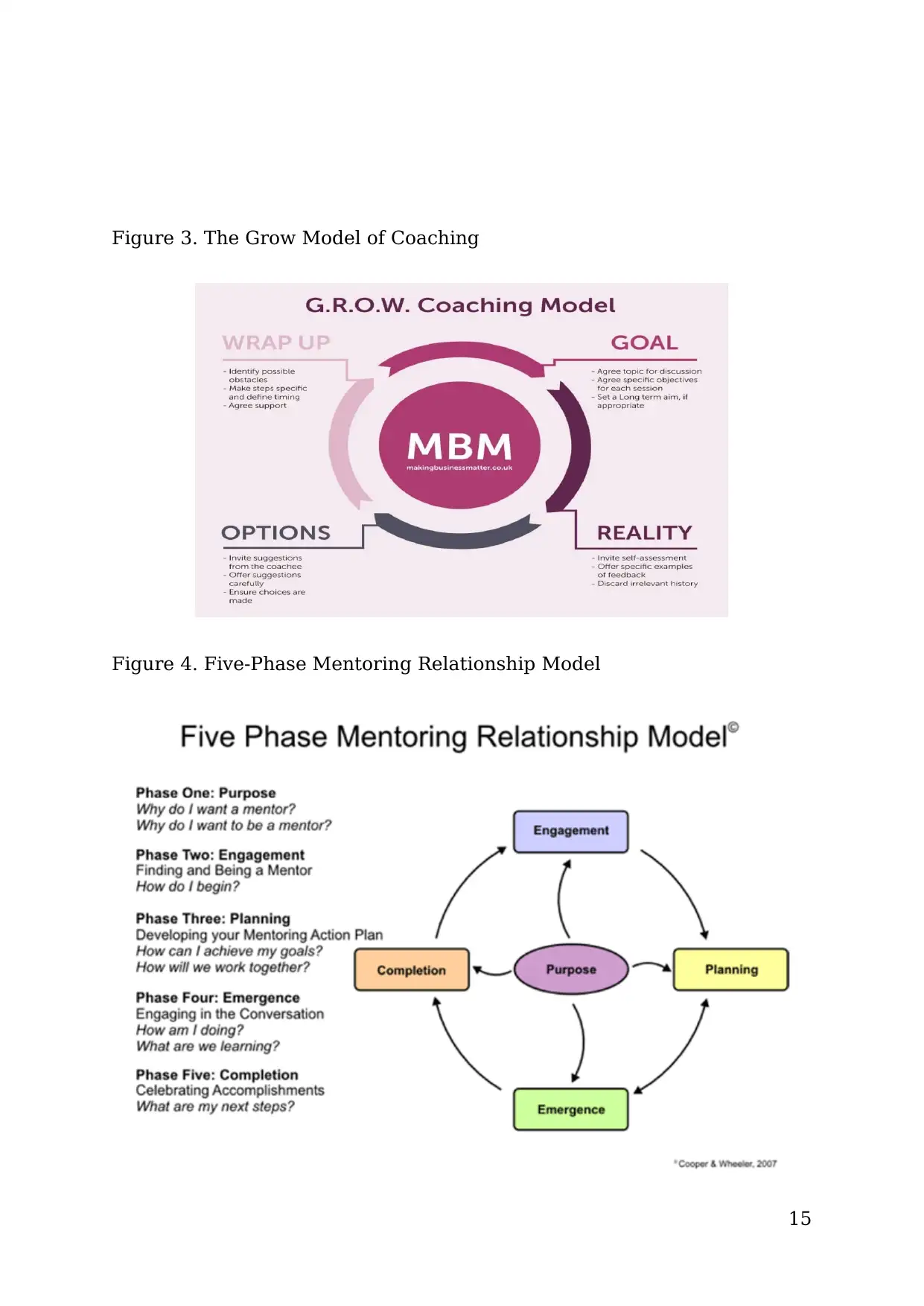
Figure 3. The Grow Model of Coaching
Figure 4. Five-Phase Mentoring Relationship Model
15
Figure 4. Five-Phase Mentoring Relationship Model
15
Secure Best Marks with AI Grader
Need help grading? Try our AI Grader for instant feedback on your assignments.
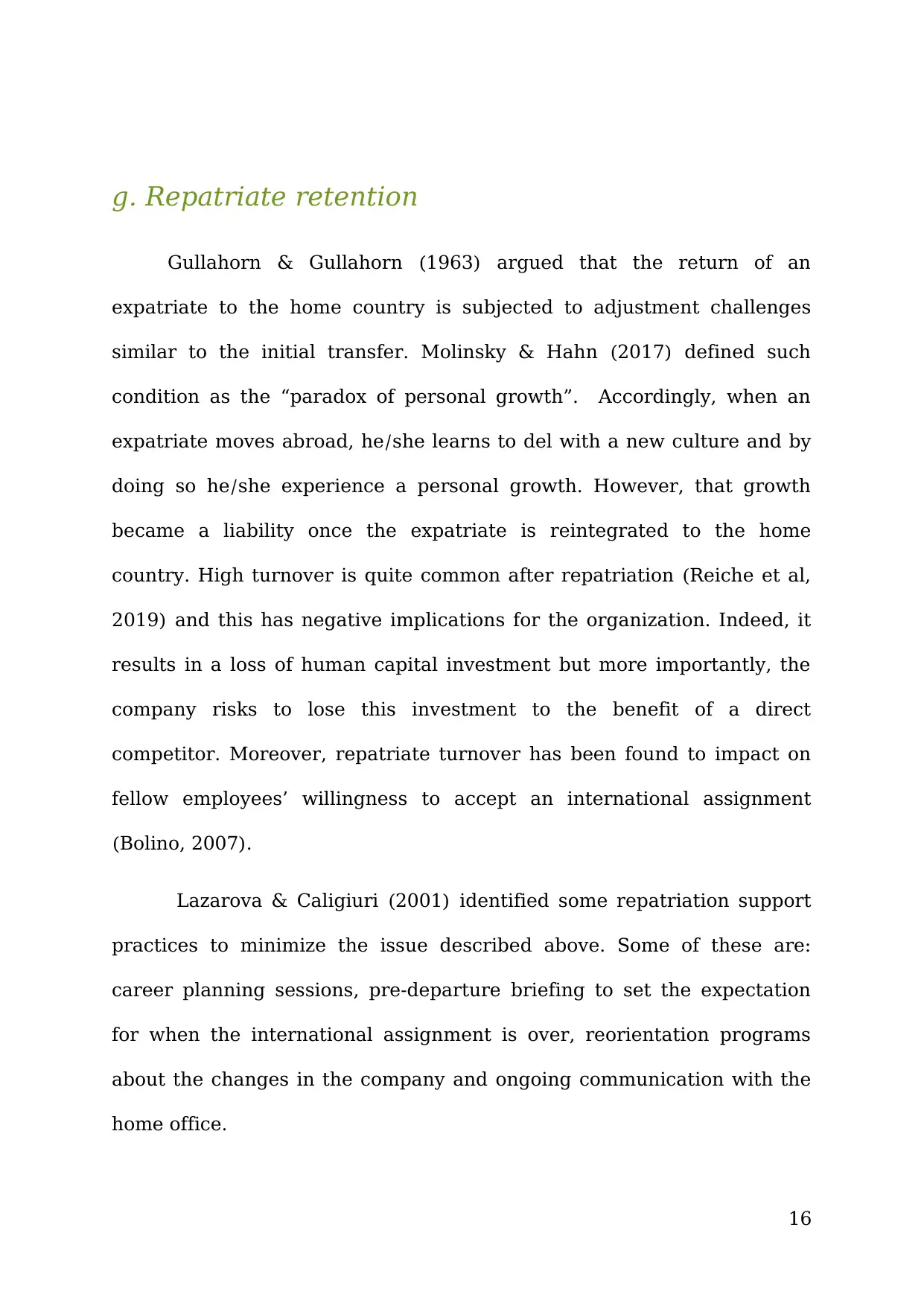
g. Repatriate retention
Gullahorn & Gullahorn (1963) argued that the return of an
expatriate to the home country is subjected to adjustment challenges
similar to the initial transfer. Molinsky & Hahn (2017) defined such
condition as the “paradox of personal growth”. Accordingly, when an
expatriate moves abroad, he/she learns to del with a new culture and by
doing so he/she experience a personal growth. However, that growth
became a liability once the expatriate is reintegrated to the home
country. High turnover is quite common after repatriation (Reiche et al,
2019) and this has negative implications for the organization. Indeed, it
results in a loss of human capital investment but more importantly, the
company risks to lose this investment to the benefit of a direct
competitor. Moreover, repatriate turnover has been found to impact on
fellow employees’ willingness to accept an international assignment
(Bolino, 2007).
Lazarova & Caligiuri (2001) identified some repatriation support
practices to minimize the issue described above. Some of these are:
career planning sessions, pre-departure briefing to set the expectation
for when the international assignment is over, reorientation programs
about the changes in the company and ongoing communication with the
home office.
16
Gullahorn & Gullahorn (1963) argued that the return of an
expatriate to the home country is subjected to adjustment challenges
similar to the initial transfer. Molinsky & Hahn (2017) defined such
condition as the “paradox of personal growth”. Accordingly, when an
expatriate moves abroad, he/she learns to del with a new culture and by
doing so he/she experience a personal growth. However, that growth
became a liability once the expatriate is reintegrated to the home
country. High turnover is quite common after repatriation (Reiche et al,
2019) and this has negative implications for the organization. Indeed, it
results in a loss of human capital investment but more importantly, the
company risks to lose this investment to the benefit of a direct
competitor. Moreover, repatriate turnover has been found to impact on
fellow employees’ willingness to accept an international assignment
(Bolino, 2007).
Lazarova & Caligiuri (2001) identified some repatriation support
practices to minimize the issue described above. Some of these are:
career planning sessions, pre-departure briefing to set the expectation
for when the international assignment is over, reorientation programs
about the changes in the company and ongoing communication with the
home office.
16
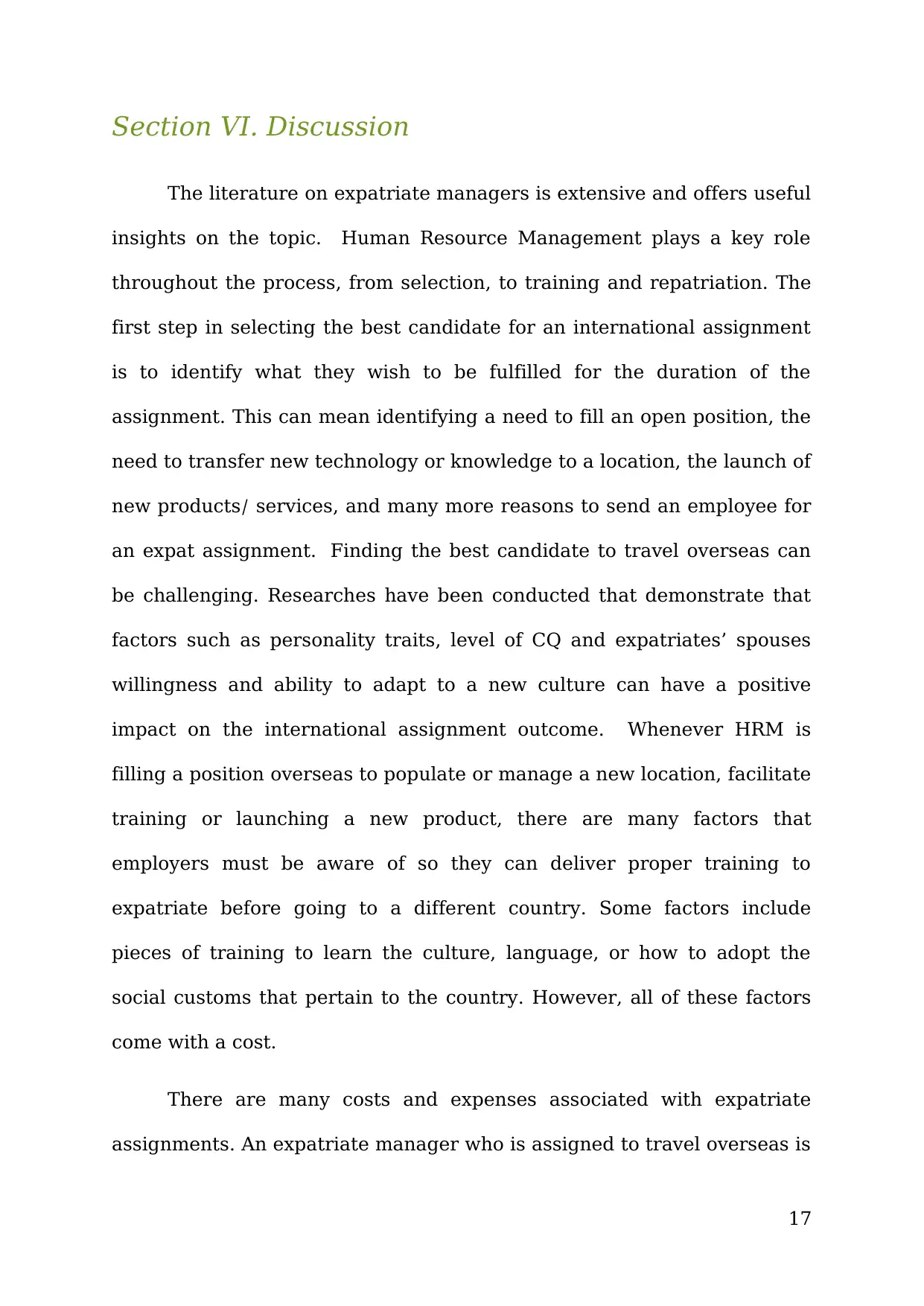
Section VI. Discussion
The literature on expatriate managers is extensive and offers useful
insights on the topic. Human Resource Management plays a key role
throughout the process, from selection, to training and repatriation. The
first step in selecting the best candidate for an international assignment
is to identify what they wish to be fulfilled for the duration of the
assignment. This can mean identifying a need to fill an open position, the
need to transfer new technology or knowledge to a location, the launch of
new products/ services, and many more reasons to send an employee for
an expat assignment. Finding the best candidate to travel overseas can
be challenging. Researches have been conducted that demonstrate that
factors such as personality traits, level of CQ and expatriates’ spouses
willingness and ability to adapt to a new culture can have a positive
impact on the international assignment outcome. Whenever HRM is
filling a position overseas to populate or manage a new location, facilitate
training or launching a new product, there are many factors that
employers must be aware of so they can deliver proper training to
expatriate before going to a different country. Some factors include
pieces of training to learn the culture, language, or how to adopt the
social customs that pertain to the country. However, all of these factors
come with a cost.
There are many costs and expenses associated with expatriate
assignments. An expatriate manager who is assigned to travel overseas is
17
The literature on expatriate managers is extensive and offers useful
insights on the topic. Human Resource Management plays a key role
throughout the process, from selection, to training and repatriation. The
first step in selecting the best candidate for an international assignment
is to identify what they wish to be fulfilled for the duration of the
assignment. This can mean identifying a need to fill an open position, the
need to transfer new technology or knowledge to a location, the launch of
new products/ services, and many more reasons to send an employee for
an expat assignment. Finding the best candidate to travel overseas can
be challenging. Researches have been conducted that demonstrate that
factors such as personality traits, level of CQ and expatriates’ spouses
willingness and ability to adapt to a new culture can have a positive
impact on the international assignment outcome. Whenever HRM is
filling a position overseas to populate or manage a new location, facilitate
training or launching a new product, there are many factors that
employers must be aware of so they can deliver proper training to
expatriate before going to a different country. Some factors include
pieces of training to learn the culture, language, or how to adopt the
social customs that pertain to the country. However, all of these factors
come with a cost.
There are many costs and expenses associated with expatriate
assignments. An expatriate manager who is assigned to travel overseas is
17
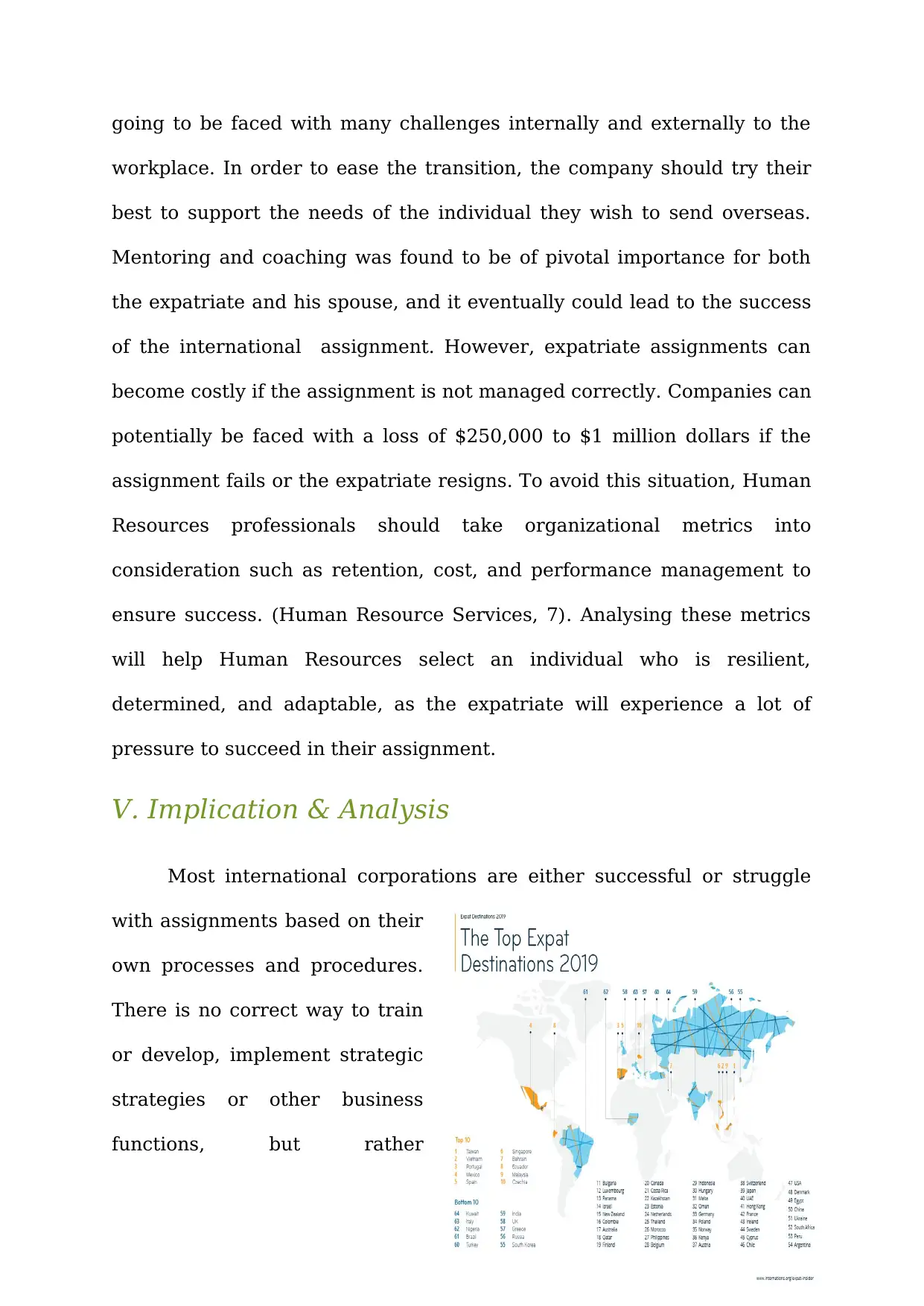
going to be faced with many challenges internally and externally to the
workplace. In order to ease the transition, the company should try their
best to support the needs of the individual they wish to send overseas.
Mentoring and coaching was found to be of pivotal importance for both
the expatriate and his spouse, and it eventually could lead to the success
of the international assignment. However, expatriate assignments can
become costly if the assignment is not managed correctly. Companies can
potentially be faced with a loss of $250,000 to $1 million dollars if the
assignment fails or the expatriate resigns. To avoid this situation, Human
Resources professionals should take organizational metrics into
consideration such as retention, cost, and performance management to
ensure success. (Human Resource Services, 7). Analysing these metrics
will help Human Resources select an individual who is resilient,
determined, and adaptable, as the expatriate will experience a lot of
pressure to succeed in their assignment.
V. Implication & Analysis
Most international corporations are either successful or struggle
with assignments based on their
own processes and procedures.
There is no correct way to train
or develop, implement strategic
strategies or other business
functions, but rather
18
workplace. In order to ease the transition, the company should try their
best to support the needs of the individual they wish to send overseas.
Mentoring and coaching was found to be of pivotal importance for both
the expatriate and his spouse, and it eventually could lead to the success
of the international assignment. However, expatriate assignments can
become costly if the assignment is not managed correctly. Companies can
potentially be faced with a loss of $250,000 to $1 million dollars if the
assignment fails or the expatriate resigns. To avoid this situation, Human
Resources professionals should take organizational metrics into
consideration such as retention, cost, and performance management to
ensure success. (Human Resource Services, 7). Analysing these metrics
will help Human Resources select an individual who is resilient,
determined, and adaptable, as the expatriate will experience a lot of
pressure to succeed in their assignment.
V. Implication & Analysis
Most international corporations are either successful or struggle
with assignments based on their
own processes and procedures.
There is no correct way to train
or develop, implement strategic
strategies or other business
functions, but rather
18
Paraphrase This Document
Need a fresh take? Get an instant paraphrase of this document with our AI Paraphraser
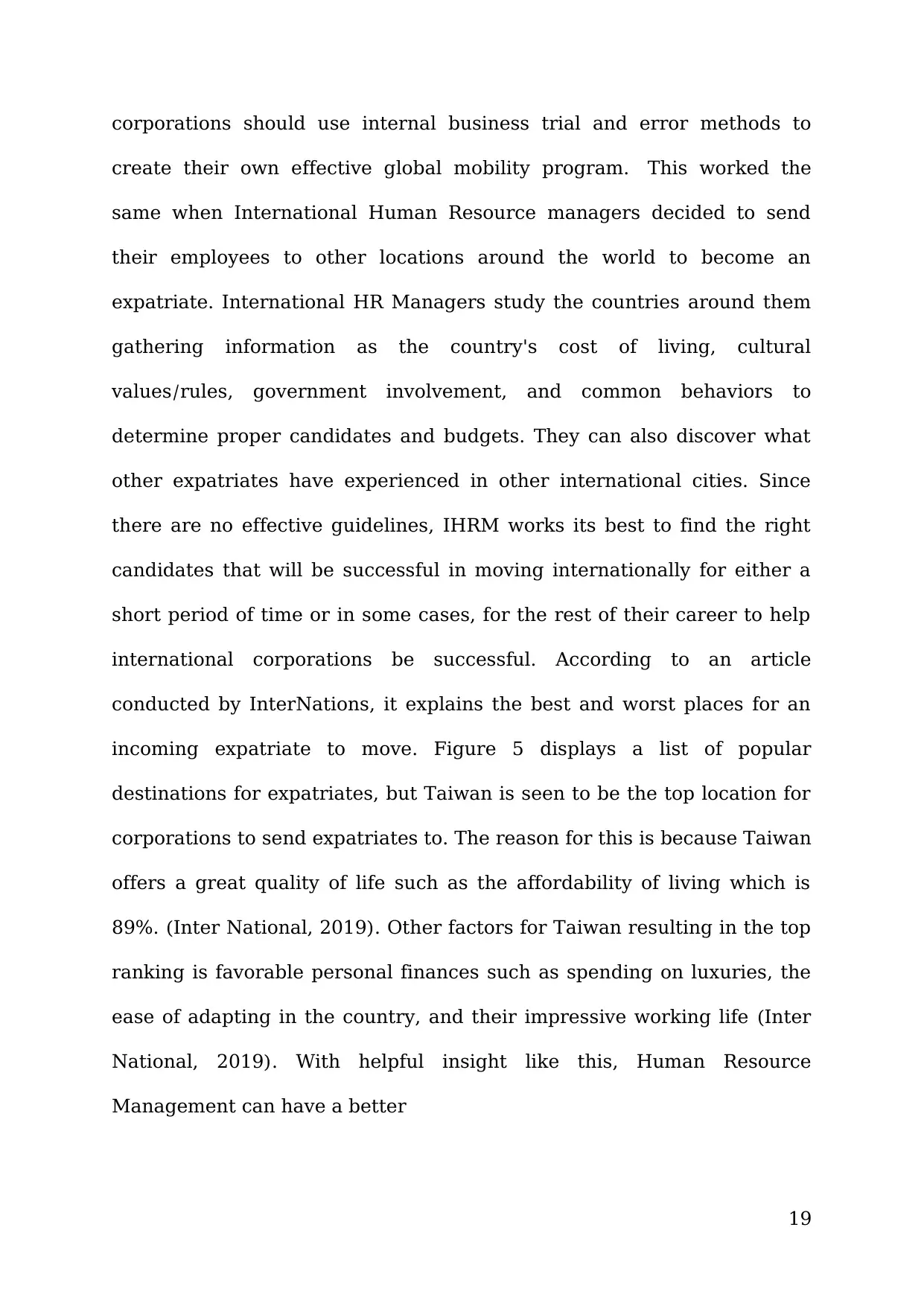
corporations should use internal business trial and error methods to
create their own effective global mobility program. This worked the
same when International Human Resource managers decided to send
their employees to other locations around the world to become an
expatriate. International HR Managers study the countries around them
gathering information as the country's cost of living, cultural
values/rules, government involvement, and common behaviors to
determine proper candidates and budgets. They can also discover what
other expatriates have experienced in other international cities. Since
there are no effective guidelines, IHRM works its best to find the right
candidates that will be successful in moving internationally for either a
short period of time or in some cases, for the rest of their career to help
international corporations be successful. According to an article
conducted by InterNations, it explains the best and worst places for an
incoming expatriate to move. Figure 5 displays a list of popular
destinations for expatriates, but Taiwan is seen to be the top location for
corporations to send expatriates to. The reason for this is because Taiwan
offers a great quality of life such as the affordability of living which is
89%. (Inter National, 2019). Other factors for Taiwan resulting in the top
ranking is favorable personal finances such as spending on luxuries, the
ease of adapting in the country, and their impressive working life (Inter
National, 2019). With helpful insight like this, Human Resource
Management can have a better
19
create their own effective global mobility program. This worked the
same when International Human Resource managers decided to send
their employees to other locations around the world to become an
expatriate. International HR Managers study the countries around them
gathering information as the country's cost of living, cultural
values/rules, government involvement, and common behaviors to
determine proper candidates and budgets. They can also discover what
other expatriates have experienced in other international cities. Since
there are no effective guidelines, IHRM works its best to find the right
candidates that will be successful in moving internationally for either a
short period of time or in some cases, for the rest of their career to help
international corporations be successful. According to an article
conducted by InterNations, it explains the best and worst places for an
incoming expatriate to move. Figure 5 displays a list of popular
destinations for expatriates, but Taiwan is seen to be the top location for
corporations to send expatriates to. The reason for this is because Taiwan
offers a great quality of life such as the affordability of living which is
89%. (Inter National, 2019). Other factors for Taiwan resulting in the top
ranking is favorable personal finances such as spending on luxuries, the
ease of adapting in the country, and their impressive working life (Inter
National, 2019). With helpful insight like this, Human Resource
Management can have a better
19
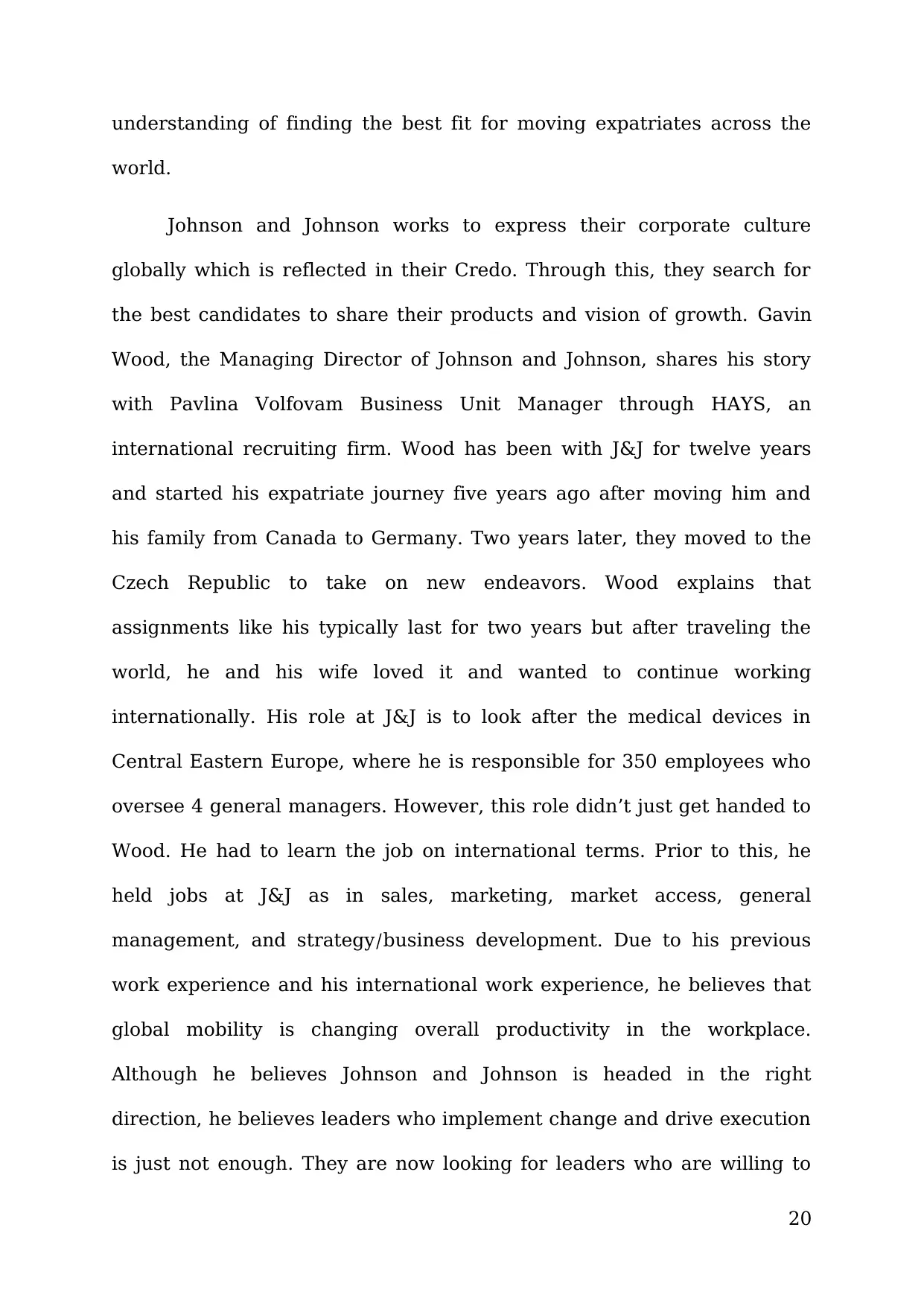
understanding of finding the best fit for moving expatriates across the
world.
Johnson and Johnson works to express their corporate culture
globally which is reflected in their Credo. Through this, they search for
the best candidates to share their products and vision of growth. Gavin
Wood, the Managing Director of Johnson and Johnson, shares his story
with Pavlina Volfovam Business Unit Manager through HAYS, an
international recruiting firm. Wood has been with J&J for twelve years
and started his expatriate journey five years ago after moving him and
his family from Canada to Germany. Two years later, they moved to the
Czech Republic to take on new endeavors. Wood explains that
assignments like his typically last for two years but after traveling the
world, he and his wife loved it and wanted to continue working
internationally. His role at J&J is to look after the medical devices in
Central Eastern Europe, where he is responsible for 350 employees who
oversee 4 general managers. However, this role didn’t just get handed to
Wood. He had to learn the job on international terms. Prior to this, he
held jobs at J&J as in sales, marketing, market access, general
management, and strategy/business development. Due to his previous
work experience and his international work experience, he believes that
global mobility is changing overall productivity in the workplace.
Although he believes Johnson and Johnson is headed in the right
direction, he believes leaders who implement change and drive execution
is just not enough. They are now looking for leaders who are willing to
20
world.
Johnson and Johnson works to express their corporate culture
globally which is reflected in their Credo. Through this, they search for
the best candidates to share their products and vision of growth. Gavin
Wood, the Managing Director of Johnson and Johnson, shares his story
with Pavlina Volfovam Business Unit Manager through HAYS, an
international recruiting firm. Wood has been with J&J for twelve years
and started his expatriate journey five years ago after moving him and
his family from Canada to Germany. Two years later, they moved to the
Czech Republic to take on new endeavors. Wood explains that
assignments like his typically last for two years but after traveling the
world, he and his wife loved it and wanted to continue working
internationally. His role at J&J is to look after the medical devices in
Central Eastern Europe, where he is responsible for 350 employees who
oversee 4 general managers. However, this role didn’t just get handed to
Wood. He had to learn the job on international terms. Prior to this, he
held jobs at J&J as in sales, marketing, market access, general
management, and strategy/business development. Due to his previous
work experience and his international work experience, he believes that
global mobility is changing overall productivity in the workplace.
Although he believes Johnson and Johnson is headed in the right
direction, he believes leaders who implement change and drive execution
is just not enough. They are now looking for leaders who are willing to
20
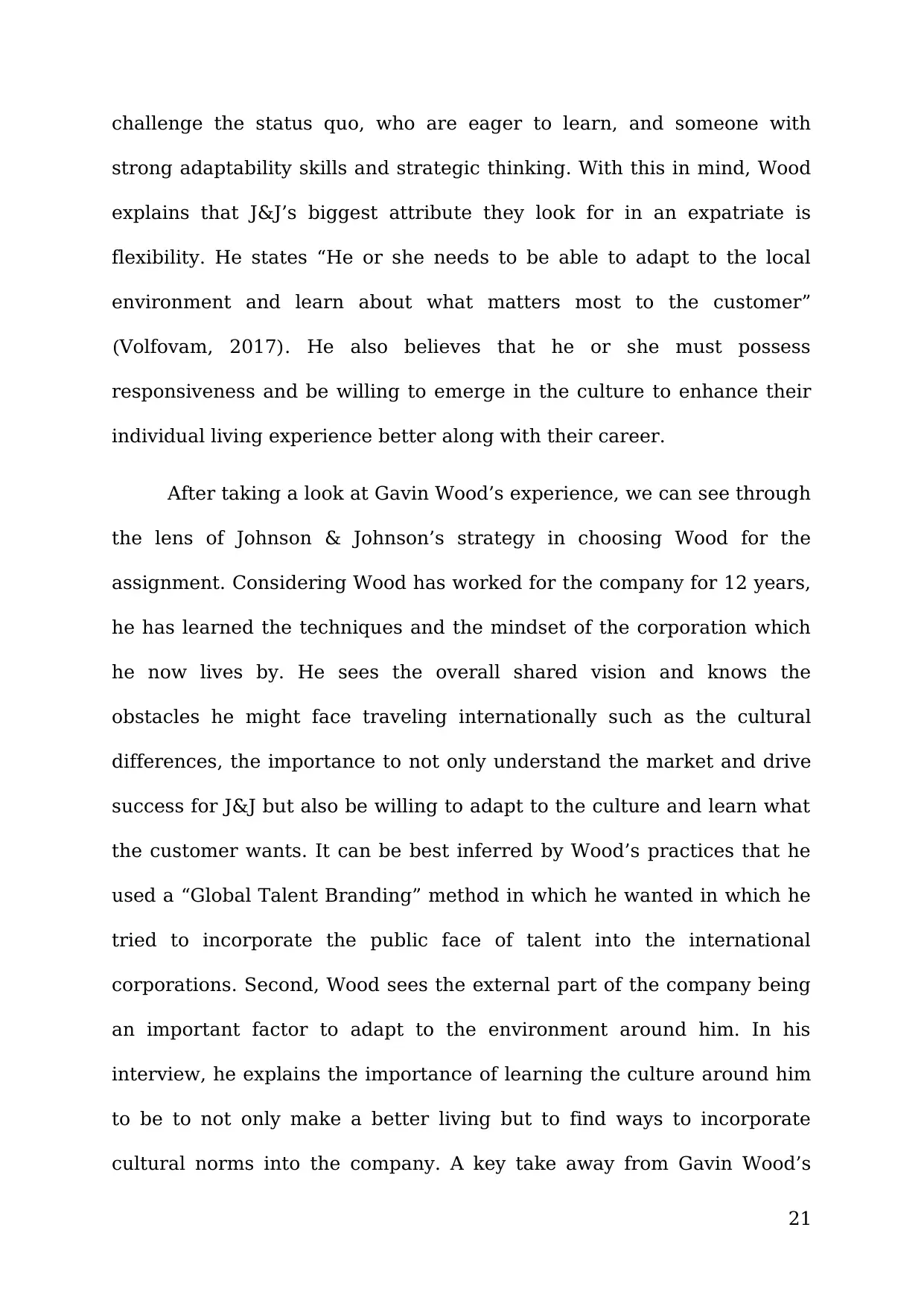
challenge the status quo, who are eager to learn, and someone with
strong adaptability skills and strategic thinking. With this in mind, Wood
explains that J&J’s biggest attribute they look for in an expatriate is
flexibility. He states “He or she needs to be able to adapt to the local
environment and learn about what matters most to the customer”
(Volfovam, 2017). He also believes that he or she must possess
responsiveness and be willing to emerge in the culture to enhance their
individual living experience better along with their career.
After taking a look at Gavin Wood’s experience, we can see through
the lens of Johnson & Johnson’s strategy in choosing Wood for the
assignment. Considering Wood has worked for the company for 12 years,
he has learned the techniques and the mindset of the corporation which
he now lives by. He sees the overall shared vision and knows the
obstacles he might face traveling internationally such as the cultural
differences, the importance to not only understand the market and drive
success for J&J but also be willing to adapt to the culture and learn what
the customer wants. It can be best inferred by Wood’s practices that he
used a “Global Talent Branding” method in which he wanted in which he
tried to incorporate the public face of talent into the international
corporations. Second, Wood sees the external part of the company being
an important factor to adapt to the environment around him. In his
interview, he explains the importance of learning the culture around him
to be to not only make a better living but to find ways to incorporate
cultural norms into the company. A key take away from Gavin Wood’s
21
strong adaptability skills and strategic thinking. With this in mind, Wood
explains that J&J’s biggest attribute they look for in an expatriate is
flexibility. He states “He or she needs to be able to adapt to the local
environment and learn about what matters most to the customer”
(Volfovam, 2017). He also believes that he or she must possess
responsiveness and be willing to emerge in the culture to enhance their
individual living experience better along with their career.
After taking a look at Gavin Wood’s experience, we can see through
the lens of Johnson & Johnson’s strategy in choosing Wood for the
assignment. Considering Wood has worked for the company for 12 years,
he has learned the techniques and the mindset of the corporation which
he now lives by. He sees the overall shared vision and knows the
obstacles he might face traveling internationally such as the cultural
differences, the importance to not only understand the market and drive
success for J&J but also be willing to adapt to the culture and learn what
the customer wants. It can be best inferred by Wood’s practices that he
used a “Global Talent Branding” method in which he wanted in which he
tried to incorporate the public face of talent into the international
corporations. Second, Wood sees the external part of the company being
an important factor to adapt to the environment around him. In his
interview, he explains the importance of learning the culture around him
to be to not only make a better living but to find ways to incorporate
cultural norms into the company. A key take away from Gavin Wood’s
21
Secure Best Marks with AI Grader
Need help grading? Try our AI Grader for instant feedback on your assignments.
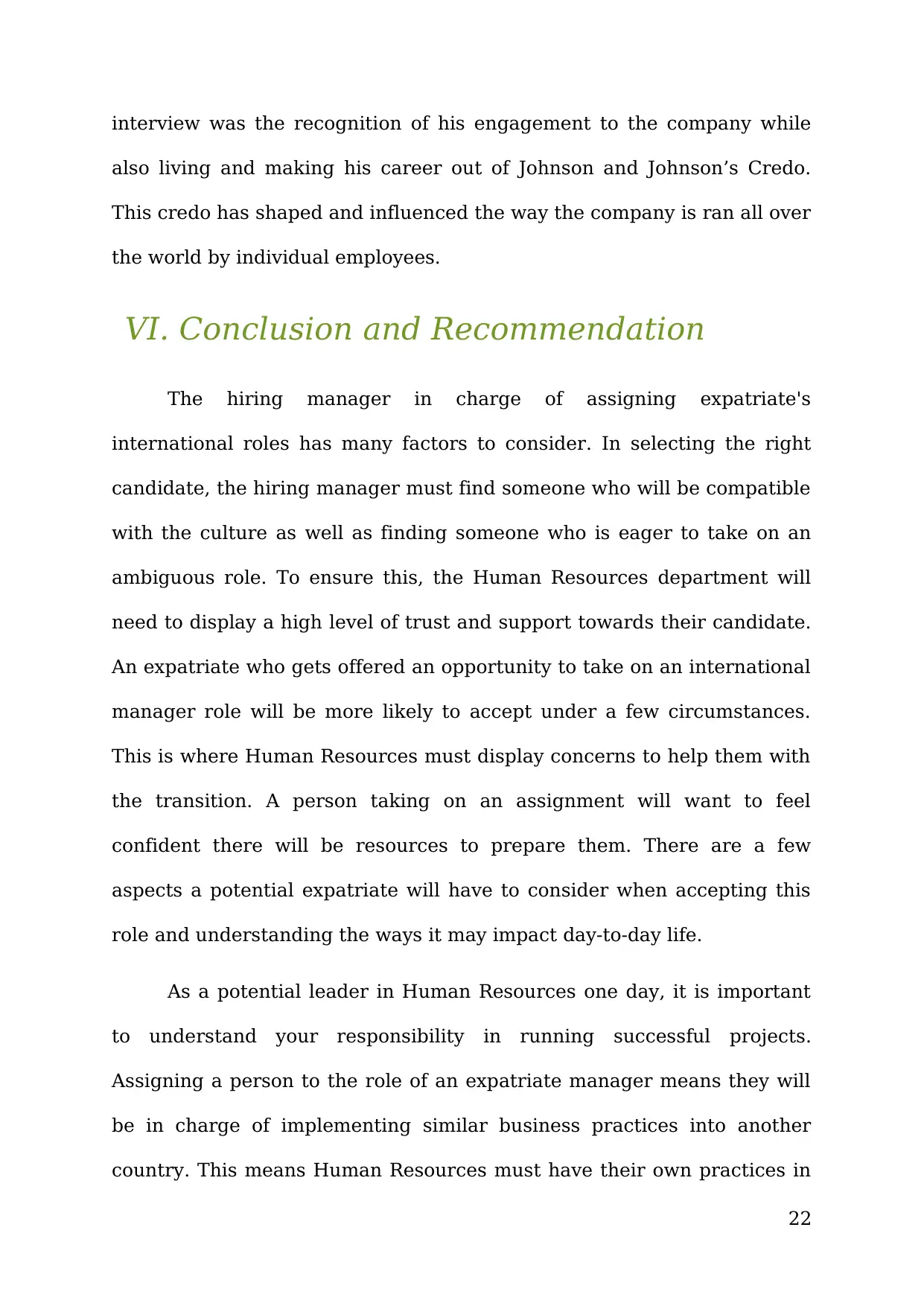
interview was the recognition of his engagement to the company while
also living and making his career out of Johnson and Johnson’s Credo.
This credo has shaped and influenced the way the company is ran all over
the world by individual employees.
VI. Conclusion and Recommendation
The hiring manager in charge of assigning expatriate's
international roles has many factors to consider. In selecting the right
candidate, the hiring manager must find someone who will be compatible
with the culture as well as finding someone who is eager to take on an
ambiguous role. To ensure this, the Human Resources department will
need to display a high level of trust and support towards their candidate.
An expatriate who gets offered an opportunity to take on an international
manager role will be more likely to accept under a few circumstances.
This is where Human Resources must display concerns to help them with
the transition. A person taking on an assignment will want to feel
confident there will be resources to prepare them. There are a few
aspects a potential expatriate will have to consider when accepting this
role and understanding the ways it may impact day-to-day life.
As a potential leader in Human Resources one day, it is important
to understand your responsibility in running successful projects.
Assigning a person to the role of an expatriate manager means they will
be in charge of implementing similar business practices into another
country. This means Human Resources must have their own practices in
22
also living and making his career out of Johnson and Johnson’s Credo.
This credo has shaped and influenced the way the company is ran all over
the world by individual employees.
VI. Conclusion and Recommendation
The hiring manager in charge of assigning expatriate's
international roles has many factors to consider. In selecting the right
candidate, the hiring manager must find someone who will be compatible
with the culture as well as finding someone who is eager to take on an
ambiguous role. To ensure this, the Human Resources department will
need to display a high level of trust and support towards their candidate.
An expatriate who gets offered an opportunity to take on an international
manager role will be more likely to accept under a few circumstances.
This is where Human Resources must display concerns to help them with
the transition. A person taking on an assignment will want to feel
confident there will be resources to prepare them. There are a few
aspects a potential expatriate will have to consider when accepting this
role and understanding the ways it may impact day-to-day life.
As a potential leader in Human Resources one day, it is important
to understand your responsibility in running successful projects.
Assigning a person to the role of an expatriate manager means they will
be in charge of implementing similar business practices into another
country. This means Human Resources must have their own practices in
22
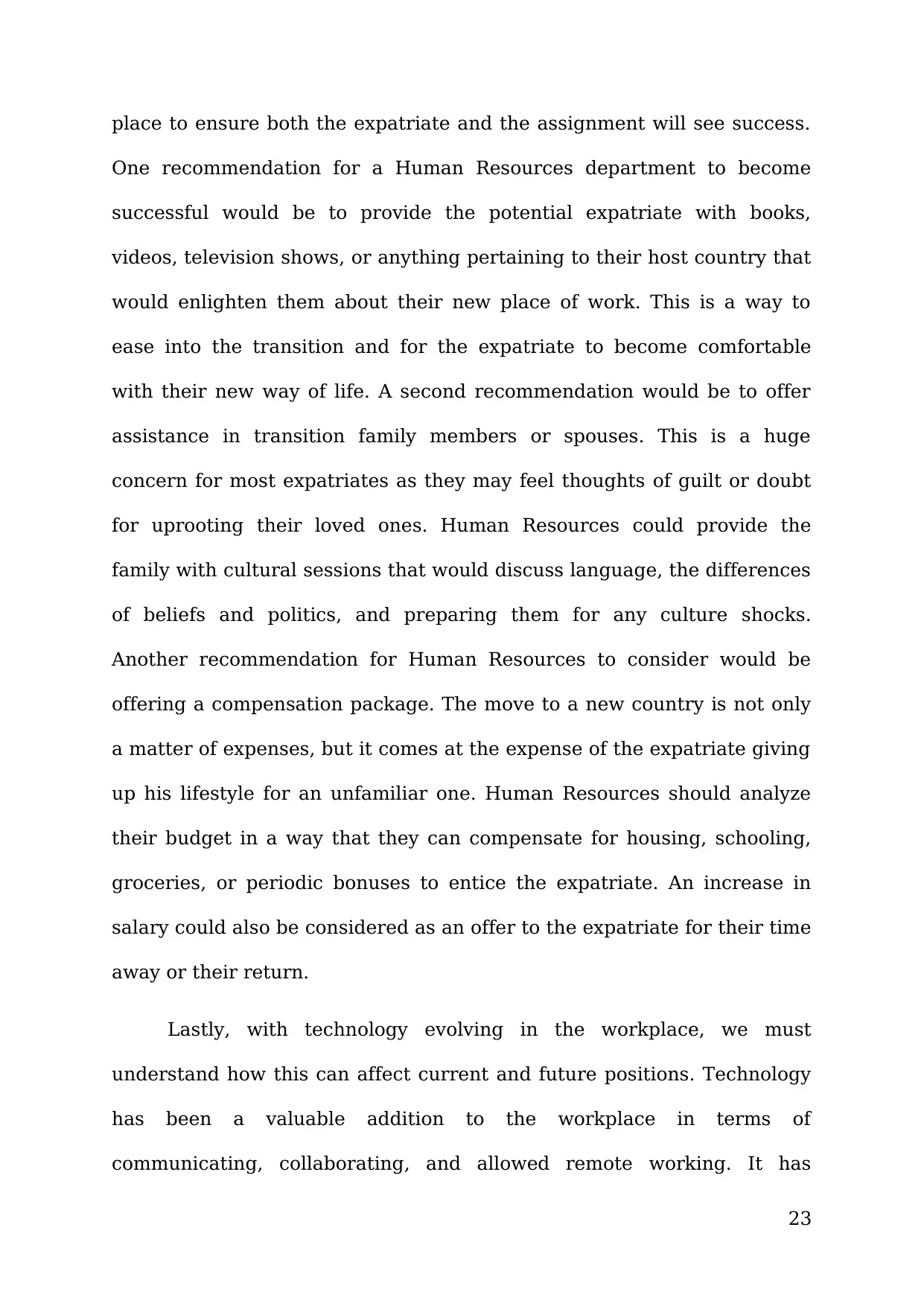
place to ensure both the expatriate and the assignment will see success.
One recommendation for a Human Resources department to become
successful would be to provide the potential expatriate with books,
videos, television shows, or anything pertaining to their host country that
would enlighten them about their new place of work. This is a way to
ease into the transition and for the expatriate to become comfortable
with their new way of life. A second recommendation would be to offer
assistance in transition family members or spouses. This is a huge
concern for most expatriates as they may feel thoughts of guilt or doubt
for uprooting their loved ones. Human Resources could provide the
family with cultural sessions that would discuss language, the differences
of beliefs and politics, and preparing them for any culture shocks.
Another recommendation for Human Resources to consider would be
offering a compensation package. The move to a new country is not only
a matter of expenses, but it comes at the expense of the expatriate giving
up his lifestyle for an unfamiliar one. Human Resources should analyze
their budget in a way that they can compensate for housing, schooling,
groceries, or periodic bonuses to entice the expatriate. An increase in
salary could also be considered as an offer to the expatriate for their time
away or their return.
Lastly, with technology evolving in the workplace, we must
understand how this can affect current and future positions. Technology
has been a valuable addition to the workplace in terms of
communicating, collaborating, and allowed remote working. It has
23
One recommendation for a Human Resources department to become
successful would be to provide the potential expatriate with books,
videos, television shows, or anything pertaining to their host country that
would enlighten them about their new place of work. This is a way to
ease into the transition and for the expatriate to become comfortable
with their new way of life. A second recommendation would be to offer
assistance in transition family members or spouses. This is a huge
concern for most expatriates as they may feel thoughts of guilt or doubt
for uprooting their loved ones. Human Resources could provide the
family with cultural sessions that would discuss language, the differences
of beliefs and politics, and preparing them for any culture shocks.
Another recommendation for Human Resources to consider would be
offering a compensation package. The move to a new country is not only
a matter of expenses, but it comes at the expense of the expatriate giving
up his lifestyle for an unfamiliar one. Human Resources should analyze
their budget in a way that they can compensate for housing, schooling,
groceries, or periodic bonuses to entice the expatriate. An increase in
salary could also be considered as an offer to the expatriate for their time
away or their return.
Lastly, with technology evolving in the workplace, we must
understand how this can affect current and future positions. Technology
has been a valuable addition to the workplace in terms of
communicating, collaborating, and allowed remote working. It has
23
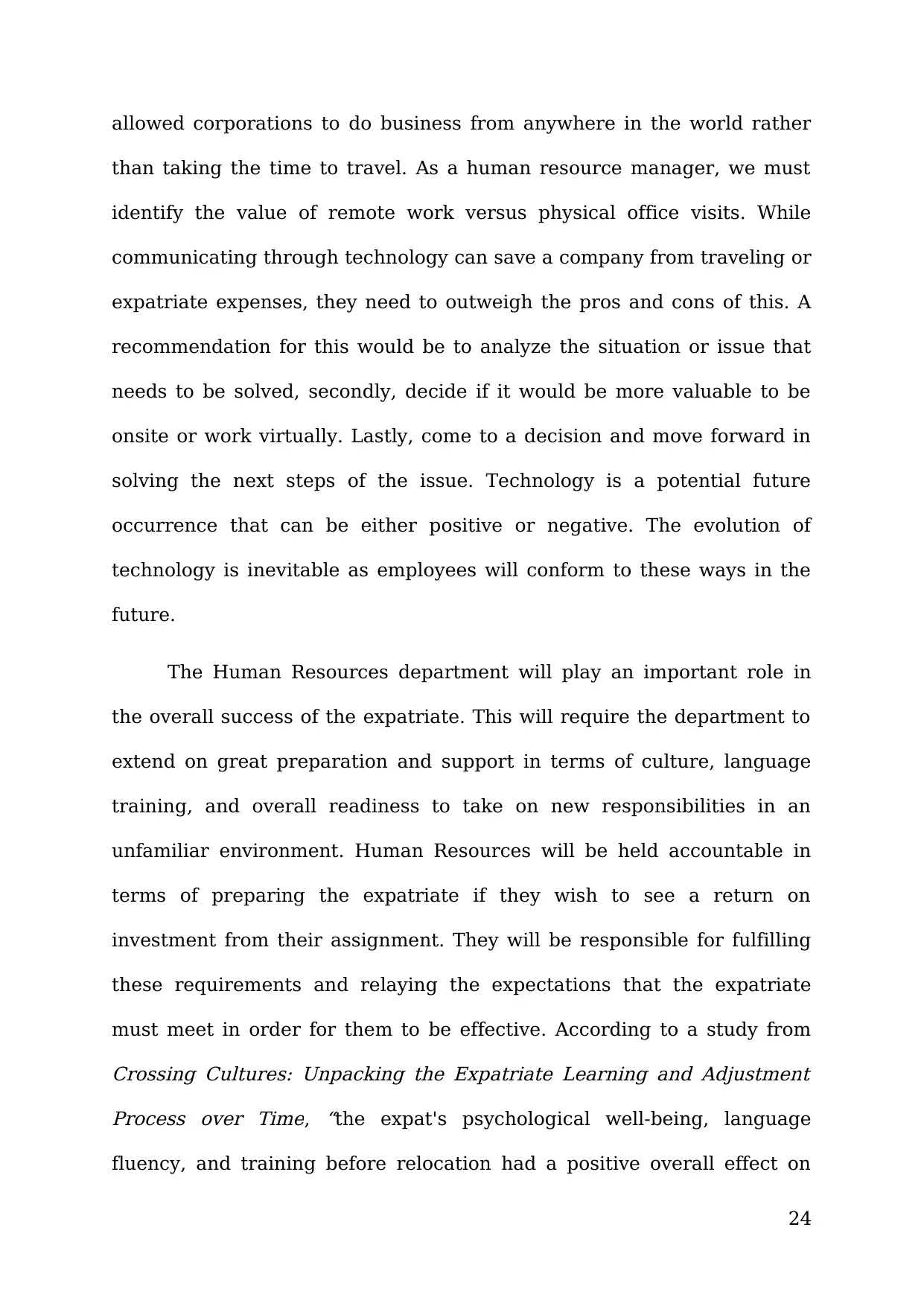
allowed corporations to do business from anywhere in the world rather
than taking the time to travel. As a human resource manager, we must
identify the value of remote work versus physical office visits. While
communicating through technology can save a company from traveling or
expatriate expenses, they need to outweigh the pros and cons of this. A
recommendation for this would be to analyze the situation or issue that
needs to be solved, secondly, decide if it would be more valuable to be
onsite or work virtually. Lastly, come to a decision and move forward in
solving the next steps of the issue. Technology is a potential future
occurrence that can be either positive or negative. The evolution of
technology is inevitable as employees will conform to these ways in the
future.
The Human Resources department will play an important role in
the overall success of the expatriate. This will require the department to
extend on great preparation and support in terms of culture, language
training, and overall readiness to take on new responsibilities in an
unfamiliar environment. Human Resources will be held accountable in
terms of preparing the expatriate if they wish to see a return on
investment from their assignment. They will be responsible for fulfilling
these requirements and relaying the expectations that the expatriate
must meet in order for them to be effective. According to a study from
Crossing Cultures: Unpacking the Expatriate Learning and Adjustment
Process over Time,
“the expat's psychological well-being, language
fluency, and training before relocation had a positive overall effect on
24
than taking the time to travel. As a human resource manager, we must
identify the value of remote work versus physical office visits. While
communicating through technology can save a company from traveling or
expatriate expenses, they need to outweigh the pros and cons of this. A
recommendation for this would be to analyze the situation or issue that
needs to be solved, secondly, decide if it would be more valuable to be
onsite or work virtually. Lastly, come to a decision and move forward in
solving the next steps of the issue. Technology is a potential future
occurrence that can be either positive or negative. The evolution of
technology is inevitable as employees will conform to these ways in the
future.
The Human Resources department will play an important role in
the overall success of the expatriate. This will require the department to
extend on great preparation and support in terms of culture, language
training, and overall readiness to take on new responsibilities in an
unfamiliar environment. Human Resources will be held accountable in
terms of preparing the expatriate if they wish to see a return on
investment from their assignment. They will be responsible for fulfilling
these requirements and relaying the expectations that the expatriate
must meet in order for them to be effective. According to a study from
Crossing Cultures: Unpacking the Expatriate Learning and Adjustment
Process over Time,
“the expat's psychological well-being, language
fluency, and training before relocation had a positive overall effect on
24
Paraphrase This Document
Need a fresh take? Get an instant paraphrase of this document with our AI Paraphraser
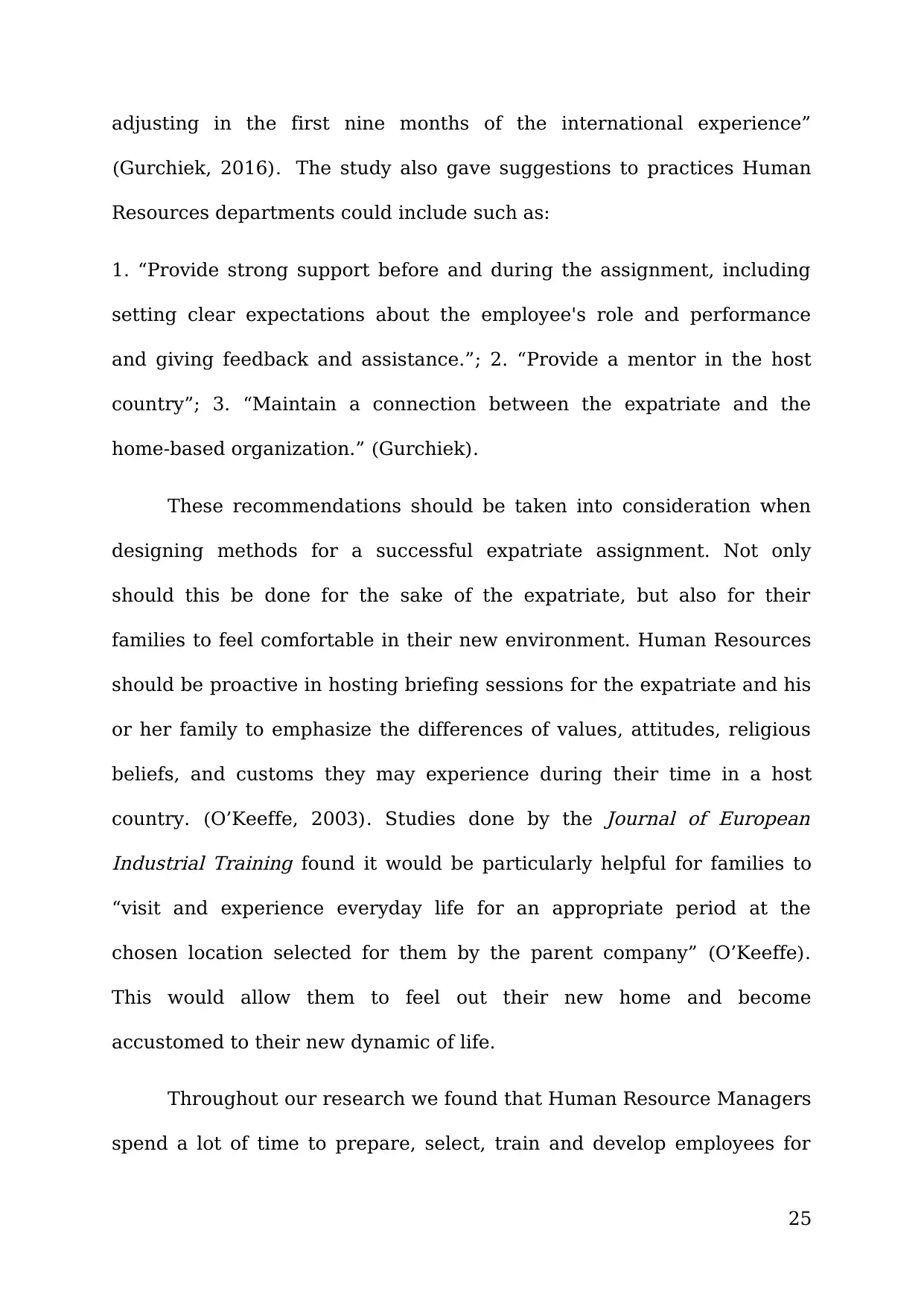
adjusting in the first nine months of the international experience”
(Gurchiek, 2016). The study also gave suggestions to practices Human
Resources departments could include such as:
1. “Provide strong support before and during the assignment, including
setting clear expectations about the employee's role and performance
and giving feedback and assistance.”; 2. “Provide a mentor in the host
country”; 3. “Maintain a connection between the expatriate and the
home-based organization.” (Gurchiek).
These recommendations should be taken into consideration when
designing methods for a successful expatriate assignment. Not only
should this be done for the sake of the expatriate, but also for their
families to feel comfortable in their new environment. Human Resources
should be proactive in hosting briefing sessions for the expatriate and his
or her family to emphasize the differences of values, attitudes, religious
beliefs, and customs they may experience during their time in a host
country. (O’Keeffe, 2003). Studies done by the
Journal of European
Industrial Training found it would be particularly helpful for families to
“visit and experience everyday life for an appropriate period at the
chosen location selected for them by the parent company” (O’Keeffe).
This would allow them to feel out their new home and become
accustomed to their new dynamic of life.
Throughout our research we found that Human Resource Managers
spend a lot of time to prepare, select, train and develop employees for
25
(Gurchiek, 2016). The study also gave suggestions to practices Human
Resources departments could include such as:
1. “Provide strong support before and during the assignment, including
setting clear expectations about the employee's role and performance
and giving feedback and assistance.”; 2. “Provide a mentor in the host
country”; 3. “Maintain a connection between the expatriate and the
home-based organization.” (Gurchiek).
These recommendations should be taken into consideration when
designing methods for a successful expatriate assignment. Not only
should this be done for the sake of the expatriate, but also for their
families to feel comfortable in their new environment. Human Resources
should be proactive in hosting briefing sessions for the expatriate and his
or her family to emphasize the differences of values, attitudes, religious
beliefs, and customs they may experience during their time in a host
country. (O’Keeffe, 2003). Studies done by the
Journal of European
Industrial Training found it would be particularly helpful for families to
“visit and experience everyday life for an appropriate period at the
chosen location selected for them by the parent company” (O’Keeffe).
This would allow them to feel out their new home and become
accustomed to their new dynamic of life.
Throughout our research we found that Human Resource Managers
spend a lot of time to prepare, select, train and develop employees for
25
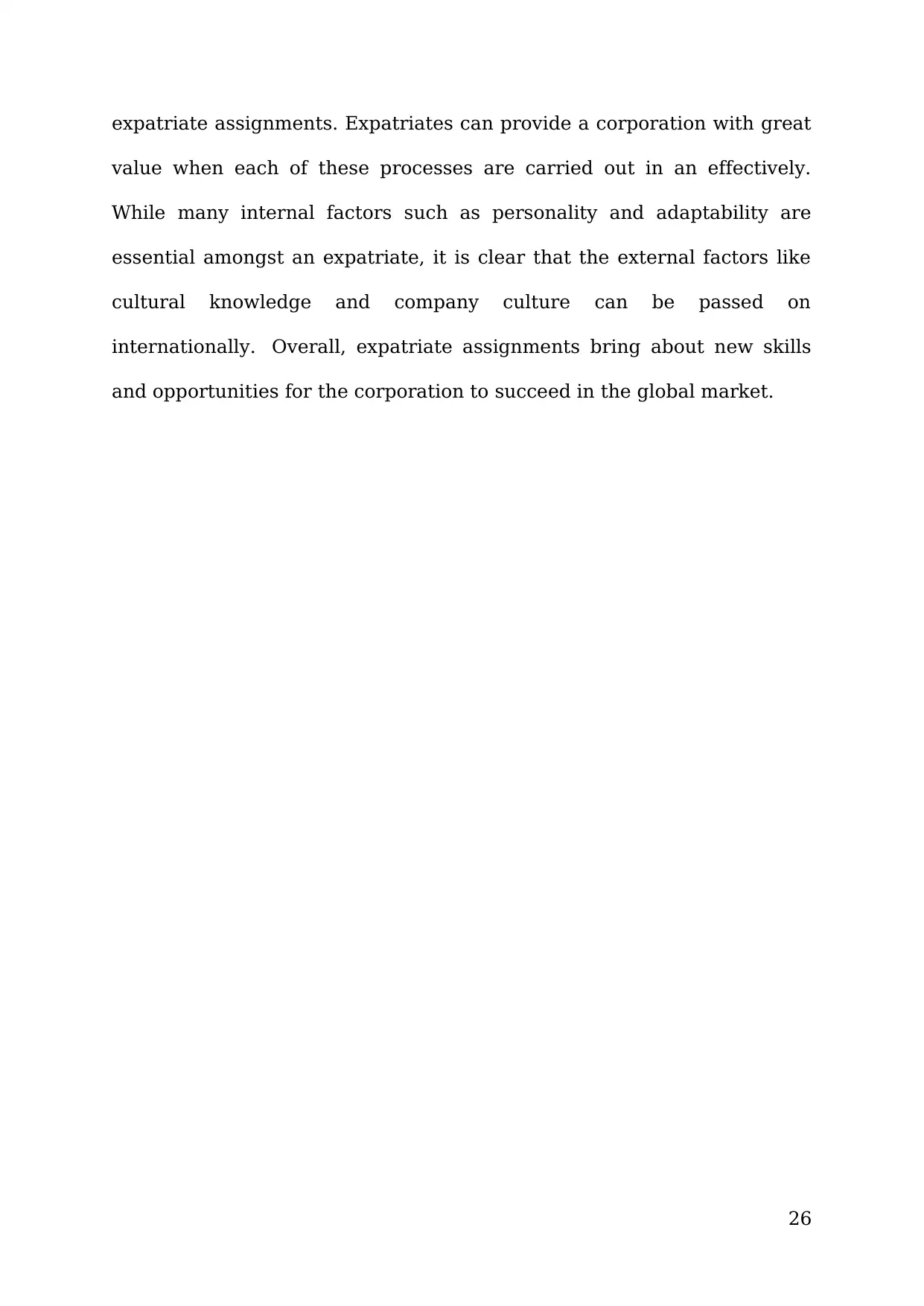
expatriate assignments. Expatriates can provide a corporation with great
value when each of these processes are carried out in an effectively.
While many internal factors such as personality and adaptability are
essential amongst an expatriate, it is clear that the external factors like
cultural knowledge and company culture can be passed on
internationally. Overall, expatriate assignments bring about new skills
and opportunities for the corporation to succeed in the global market.
26
value when each of these processes are carried out in an effectively.
While many internal factors such as personality and adaptability are
essential amongst an expatriate, it is clear that the external factors like
cultural knowledge and company culture can be passed on
internationally. Overall, expatriate assignments bring about new skills
and opportunities for the corporation to succeed in the global market.
26
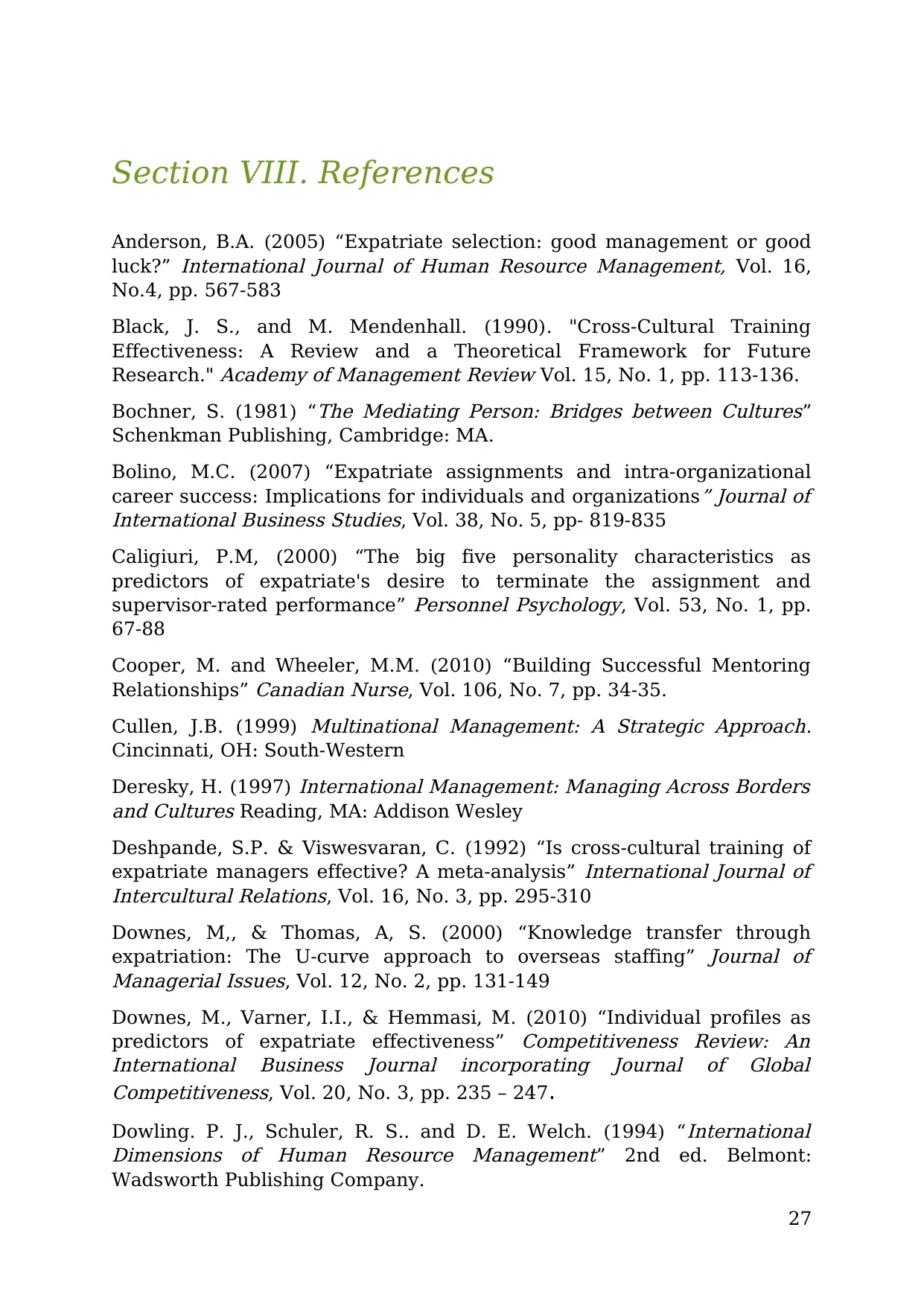
Section VIII. References
Anderson, B.A. (2005) “Expatriate selection: good management or good
luck?”
International Journal of Human Resource Management, Vol. 16,
No.4, pp. 567-583
Black, J. S., and M. Mendenhall. (1990). "Cross-Cultural Training
Effectiveness: A Review and a Theoretical Framework for Future
Research."
Academy of Management Review Vol. 15, No. 1, pp. 113-136.
Bochner, S. (1981) “
The Mediating Person: Bridges between Cultures”
Schenkman Publishing, Cambridge: MA.
Bolino, M.C. (2007) “Expatriate assignments and intra-organizational
career success: Implications for individuals and organizations
” Journal of
International Business Studies, Vol. 38, No. 5, pp- 819-835
Caligiuri, P.M, (2000) “The big five personality characteristics as
predictors of expatriate's desire to terminate the assignment and
supervisor-rated performance”
Personnel Psychology, Vol. 53, No. 1, pp.
67-88
Cooper, M. and Wheeler, M.M. (2010) “Building Successful Mentoring
Relationships”
Canadian Nurse, Vol. 106, No. 7, pp. 34-35.
Cullen, J.B. (1999)
Multinational Management: A Strategic Approach.
Cincinnati, OH: South-Western
Deresky, H. (1997)
International Management: Managing Across Borders
and Cultures Reading, MA: Addison Wesley
Deshpande, S.P. & Viswesvaran, C. (1992) “Is cross-cultural training of
expatriate managers effective? A meta-analysis”
International Journal of
Intercultural Relations, Vol. 16, No. 3, pp. 295-310
Downes, M,, & Thomas, A, S. (2000) “Knowledge transfer through
expatriation: The U-curve approach to overseas staffing”
Journal of
Managerial Issues, Vol. 12, No. 2, pp. 131-149
Downes, M., Varner, I.I., & Hemmasi, M. (2010) “Individual profiles as
predictors of expatriate effectiveness”
Competitiveness Review: An
International Business Journal incorporating Journal of Global
Competitiveness, Vol. 20, No. 3, pp. 235 – 247.
Dowling. P. J., Schuler, R. S.. and D. E. Welch. (1994) “
International
Dimensions of Human Resource Management” 2nd ed. Belmont:
Wadsworth Publishing Company.
27
Anderson, B.A. (2005) “Expatriate selection: good management or good
luck?”
International Journal of Human Resource Management, Vol. 16,
No.4, pp. 567-583
Black, J. S., and M. Mendenhall. (1990). "Cross-Cultural Training
Effectiveness: A Review and a Theoretical Framework for Future
Research."
Academy of Management Review Vol. 15, No. 1, pp. 113-136.
Bochner, S. (1981) “
The Mediating Person: Bridges between Cultures”
Schenkman Publishing, Cambridge: MA.
Bolino, M.C. (2007) “Expatriate assignments and intra-organizational
career success: Implications for individuals and organizations
” Journal of
International Business Studies, Vol. 38, No. 5, pp- 819-835
Caligiuri, P.M, (2000) “The big five personality characteristics as
predictors of expatriate's desire to terminate the assignment and
supervisor-rated performance”
Personnel Psychology, Vol. 53, No. 1, pp.
67-88
Cooper, M. and Wheeler, M.M. (2010) “Building Successful Mentoring
Relationships”
Canadian Nurse, Vol. 106, No. 7, pp. 34-35.
Cullen, J.B. (1999)
Multinational Management: A Strategic Approach.
Cincinnati, OH: South-Western
Deresky, H. (1997)
International Management: Managing Across Borders
and Cultures Reading, MA: Addison Wesley
Deshpande, S.P. & Viswesvaran, C. (1992) “Is cross-cultural training of
expatriate managers effective? A meta-analysis”
International Journal of
Intercultural Relations, Vol. 16, No. 3, pp. 295-310
Downes, M,, & Thomas, A, S. (2000) “Knowledge transfer through
expatriation: The U-curve approach to overseas staffing”
Journal of
Managerial Issues, Vol. 12, No. 2, pp. 131-149
Downes, M., Varner, I.I., & Hemmasi, M. (2010) “Individual profiles as
predictors of expatriate effectiveness”
Competitiveness Review: An
International Business Journal incorporating Journal of Global
Competitiveness, Vol. 20, No. 3, pp. 235 – 247.
Dowling. P. J., Schuler, R. S.. and D. E. Welch. (1994) “
International
Dimensions of Human Resource Management” 2nd ed. Belmont:
Wadsworth Publishing Company.
27
Secure Best Marks with AI Grader
Need help grading? Try our AI Grader for instant feedback on your assignments.
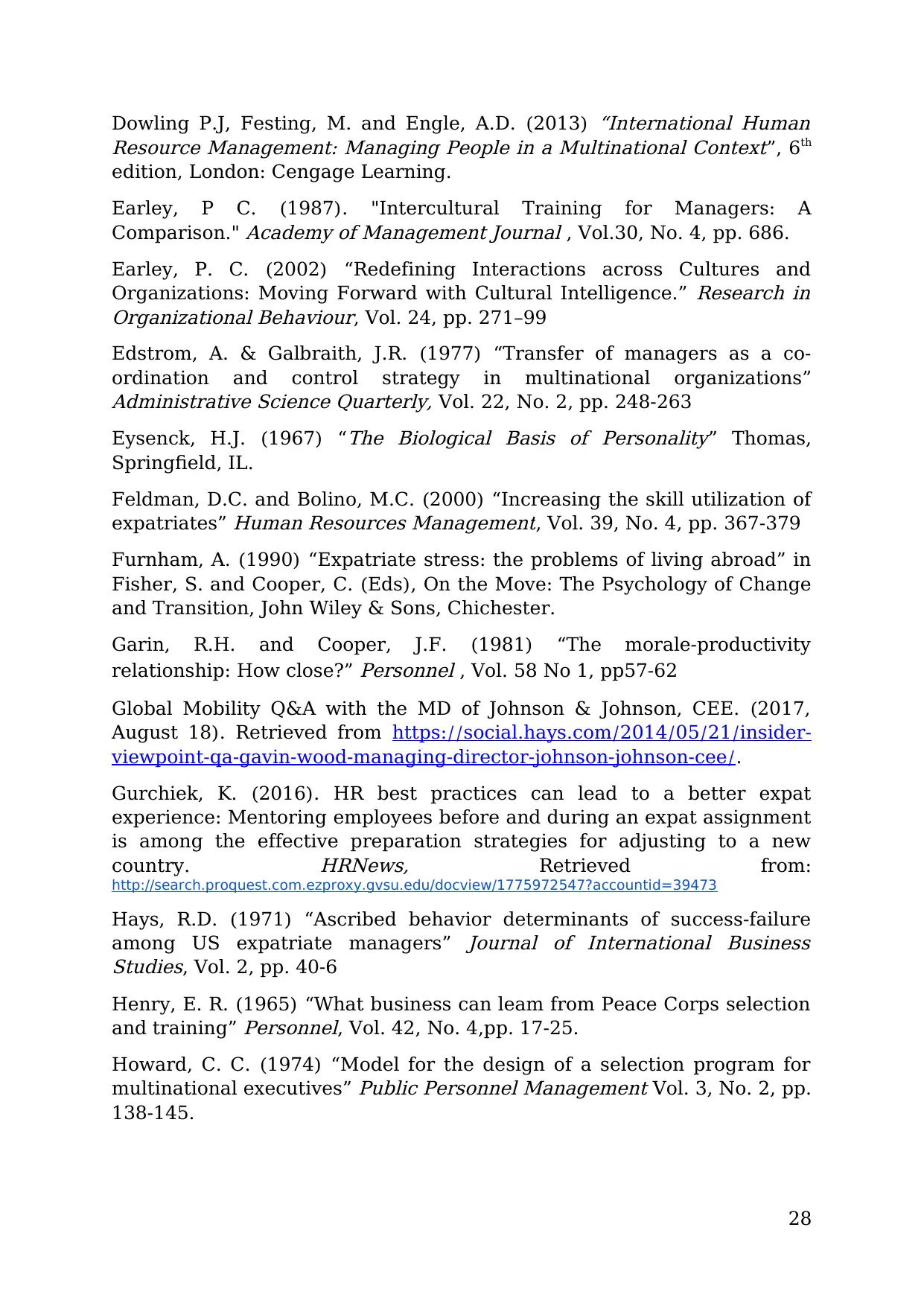
Dowling P.J, Festing, M. and Engle, A.D. (2013)
“International Human
Resource Management: Managing People in a Multinational Context”, 6th
edition, London: Cengage Learning.
Earley, P C. (1987). "Intercultural Training for Managers: A
Comparison."
Academy of Management Journal , Vol.30, No. 4, pp. 686.
Earley, P. C. (2002) “Redefining Interactions across Cultures and
Organizations: Moving Forward with Cultural Intelligence.”
Research in
Organizational Behaviour, Vol. 24, pp. 271–99
Edstrom, A. & Galbraith, J.R. (1977) “Transfer of managers as a co-
ordination and control strategy in multinational organizations”Administrative Science Quarterly, Vol. 22, No. 2, pp. 248-263
Eysenck, H.J. (1967) “
The Biological Basis of Personality” Thomas,
Springfield, IL.
Feldman, D.C. and Bolino, M.C. (2000) “Increasing the skill utilization of
expatriates”
Human Resources Management, Vol. 39, No. 4, pp. 367-379
Furnham, A. (1990) “Expatriate stress: the problems of living abroad” in
Fisher, S. and Cooper, C. (Eds), On the Move: The Psychology of Change
and Transition, John Wiley & Sons, Chichester.
Garin, R.H. and Cooper, J.F. (1981) “The morale-productivity
relationship: How close?”
Personnel , Vol. 58 No 1, pp57-62
Global Mobility Q&A with the MD of Johnson & Johnson, CEE. (2017,
August 18). Retrieved from https://social.hays.com/2014/05/21/insider-
viewpoint-qa-gavin-wood-managing-director-johnson-johnson-cee/.
Gurchiek, K. (2016). HR best practices can lead to a better expat
experience: Mentoring employees before and during an expat assignment
is among the effective preparation strategies for adjusting to a new
country.
HRNews, Retrieved from:
http://search.proquest.com.ezproxy.gvsu.edu/docview/1775972547?accountid=39473
Hays, R.D. (1971) “Ascribed behavior determinants of success-failure
among US expatriate managers”
Journal of International Business
Studies, Vol. 2, pp. 40-6
Henry, E. R. (1965) “What business can leam from Peace Corps selection
and training”
Personnel, Vol. 42, No. 4,pp. 17-25.
Howard, C. C. (1974) “Model for the design of a selection program for
multinational executives”
Public Personnel Management Vol. 3, No. 2, pp.
138-145.
28
“International Human
Resource Management: Managing People in a Multinational Context”, 6th
edition, London: Cengage Learning.
Earley, P C. (1987). "Intercultural Training for Managers: A
Comparison."
Academy of Management Journal , Vol.30, No. 4, pp. 686.
Earley, P. C. (2002) “Redefining Interactions across Cultures and
Organizations: Moving Forward with Cultural Intelligence.”
Research in
Organizational Behaviour, Vol. 24, pp. 271–99
Edstrom, A. & Galbraith, J.R. (1977) “Transfer of managers as a co-
ordination and control strategy in multinational organizations”Administrative Science Quarterly, Vol. 22, No. 2, pp. 248-263
Eysenck, H.J. (1967) “
The Biological Basis of Personality” Thomas,
Springfield, IL.
Feldman, D.C. and Bolino, M.C. (2000) “Increasing the skill utilization of
expatriates”
Human Resources Management, Vol. 39, No. 4, pp. 367-379
Furnham, A. (1990) “Expatriate stress: the problems of living abroad” in
Fisher, S. and Cooper, C. (Eds), On the Move: The Psychology of Change
and Transition, John Wiley & Sons, Chichester.
Garin, R.H. and Cooper, J.F. (1981) “The morale-productivity
relationship: How close?”
Personnel , Vol. 58 No 1, pp57-62
Global Mobility Q&A with the MD of Johnson & Johnson, CEE. (2017,
August 18). Retrieved from https://social.hays.com/2014/05/21/insider-
viewpoint-qa-gavin-wood-managing-director-johnson-johnson-cee/.
Gurchiek, K. (2016). HR best practices can lead to a better expat
experience: Mentoring employees before and during an expat assignment
is among the effective preparation strategies for adjusting to a new
country.
HRNews, Retrieved from:
http://search.proquest.com.ezproxy.gvsu.edu/docview/1775972547?accountid=39473
Hays, R.D. (1971) “Ascribed behavior determinants of success-failure
among US expatriate managers”
Journal of International Business
Studies, Vol. 2, pp. 40-6
Henry, E. R. (1965) “What business can leam from Peace Corps selection
and training”
Personnel, Vol. 42, No. 4,pp. 17-25.
Howard, C. C. (1974) “Model for the design of a selection program for
multinational executives”
Public Personnel Management Vol. 3, No. 2, pp.
138-145.
28
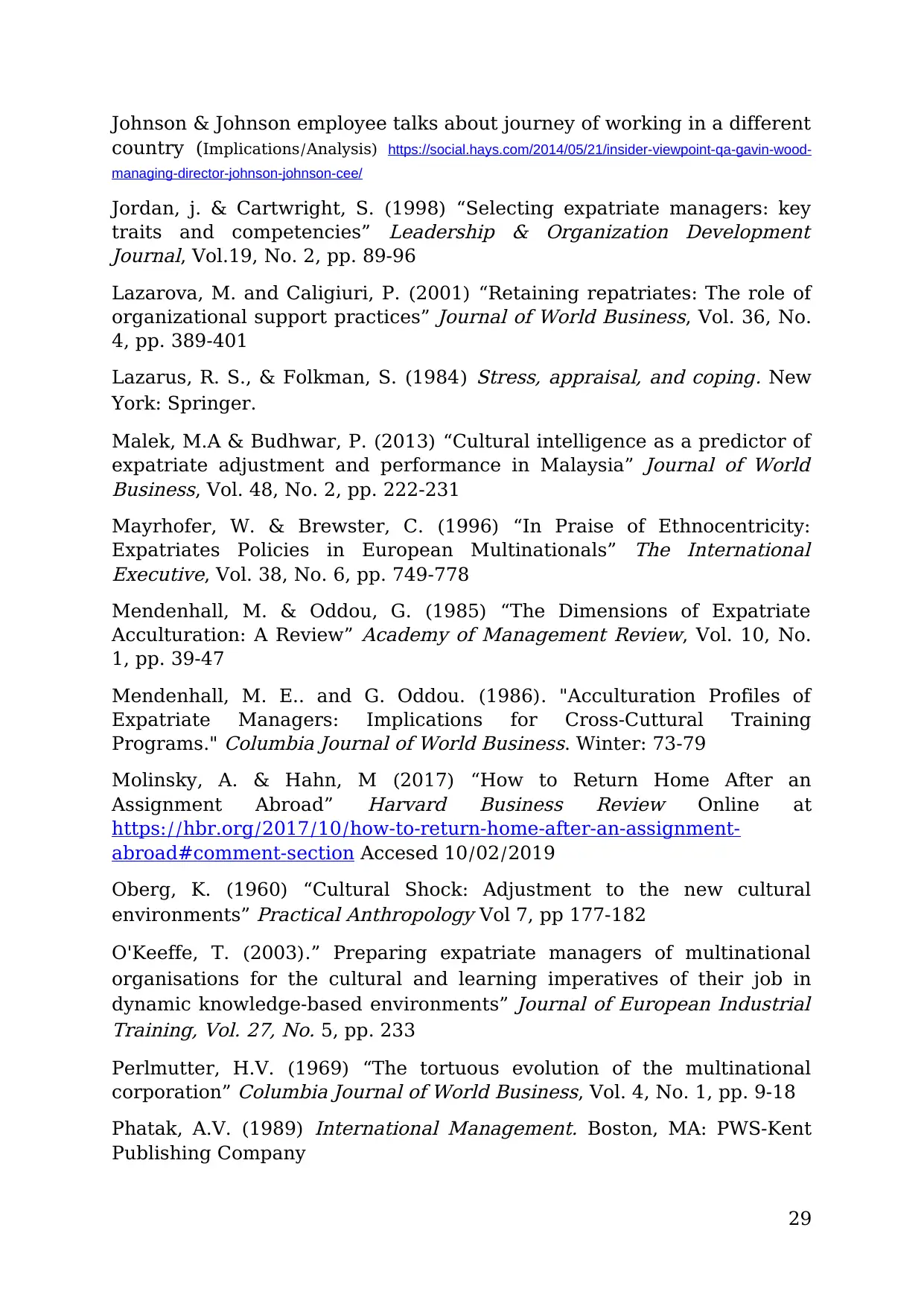
Johnson & Johnson employee talks about journey of working in a different
country (Implications/Analysis) https://social.hays.com/2014/05/21/insider-viewpoint-qa-gavin-wood-
managing-director-johnson-johnson-cee/
Jordan, j. & Cartwright, S. (1998) “Selecting expatriate managers: key
traits and competencies”
Leadership & Organization Development
Journal, Vol.19, No. 2, pp. 89-96
Lazarova, M. and Caligiuri, P. (2001) “Retaining repatriates: The role of
organizational support practices”
Journal of World Business, Vol. 36, No.
4, pp. 389-401
Lazarus, R. S., & Folkman, S. (1984)
Stress, appraisal, and coping. New
York: Springer.
Malek, M.A & Budhwar, P. (2013) “Cultural intelligence as a predictor of
expatriate adjustment and performance in Malaysia”
Journal of World
Business, Vol. 48, No. 2, pp. 222-231
Mayrhofer, W. & Brewster, C. (1996) “In Praise of Ethnocentricity:
Expatriates Policies in European Multinationals”
The International
Executive, Vol. 38, No. 6, pp. 749-778
Mendenhall, M. & Oddou, G. (1985) “The Dimensions of Expatriate
Acculturation: A Review”
Academy of Management Review, Vol. 10, No.
1, pp. 39-47
Mendenhall, M. E.. and G. Oddou. (1986). "Acculturation Profiles of
Expatriate Managers: Implications for Cross-Cuttural Training
Programs."
Columbia Journal of World Business. Winter: 73-79
Molinsky, A. & Hahn, M (2017) “How to Return Home After an
Assignment Abroad”
Harvard Business Review Online at
https://hbr.org/2017/10/how-to-return-home-after-an-assignment-
abroad#comment-section Accesed 10/02/2019
Oberg, K. (1960) “Cultural Shock: Adjustment to the new cultural
environments”
Practical Anthropology Vol 7, pp 177-182
O'Keeffe, T. (2003).” Preparing expatriate managers of multinational
organisations for the cultural and learning imperatives of their job in
dynamic knowledge-based environments”
Journal of European Industrial
Training, Vol. 27, No. 5, pp. 233
Perlmutter, H.V. (1969) “The tortuous evolution of the multinational
corporation”
Columbia Journal of World Business, Vol. 4, No. 1, pp. 9-18
Phatak, A.V. (1989)
International Management. Boston, MA: PWS-Kent
Publishing Company
29
country (Implications/Analysis) https://social.hays.com/2014/05/21/insider-viewpoint-qa-gavin-wood-
managing-director-johnson-johnson-cee/
Jordan, j. & Cartwright, S. (1998) “Selecting expatriate managers: key
traits and competencies”
Leadership & Organization Development
Journal, Vol.19, No. 2, pp. 89-96
Lazarova, M. and Caligiuri, P. (2001) “Retaining repatriates: The role of
organizational support practices”
Journal of World Business, Vol. 36, No.
4, pp. 389-401
Lazarus, R. S., & Folkman, S. (1984)
Stress, appraisal, and coping. New
York: Springer.
Malek, M.A & Budhwar, P. (2013) “Cultural intelligence as a predictor of
expatriate adjustment and performance in Malaysia”
Journal of World
Business, Vol. 48, No. 2, pp. 222-231
Mayrhofer, W. & Brewster, C. (1996) “In Praise of Ethnocentricity:
Expatriates Policies in European Multinationals”
The International
Executive, Vol. 38, No. 6, pp. 749-778
Mendenhall, M. & Oddou, G. (1985) “The Dimensions of Expatriate
Acculturation: A Review”
Academy of Management Review, Vol. 10, No.
1, pp. 39-47
Mendenhall, M. E.. and G. Oddou. (1986). "Acculturation Profiles of
Expatriate Managers: Implications for Cross-Cuttural Training
Programs."
Columbia Journal of World Business. Winter: 73-79
Molinsky, A. & Hahn, M (2017) “How to Return Home After an
Assignment Abroad”
Harvard Business Review Online at
https://hbr.org/2017/10/how-to-return-home-after-an-assignment-
abroad#comment-section Accesed 10/02/2019
Oberg, K. (1960) “Cultural Shock: Adjustment to the new cultural
environments”
Practical Anthropology Vol 7, pp 177-182
O'Keeffe, T. (2003).” Preparing expatriate managers of multinational
organisations for the cultural and learning imperatives of their job in
dynamic knowledge-based environments”
Journal of European Industrial
Training, Vol. 27, No. 5, pp. 233
Perlmutter, H.V. (1969) “The tortuous evolution of the multinational
corporation”
Columbia Journal of World Business, Vol. 4, No. 1, pp. 9-18
Phatak, A.V. (1989)
International Management. Boston, MA: PWS-Kent
Publishing Company
29
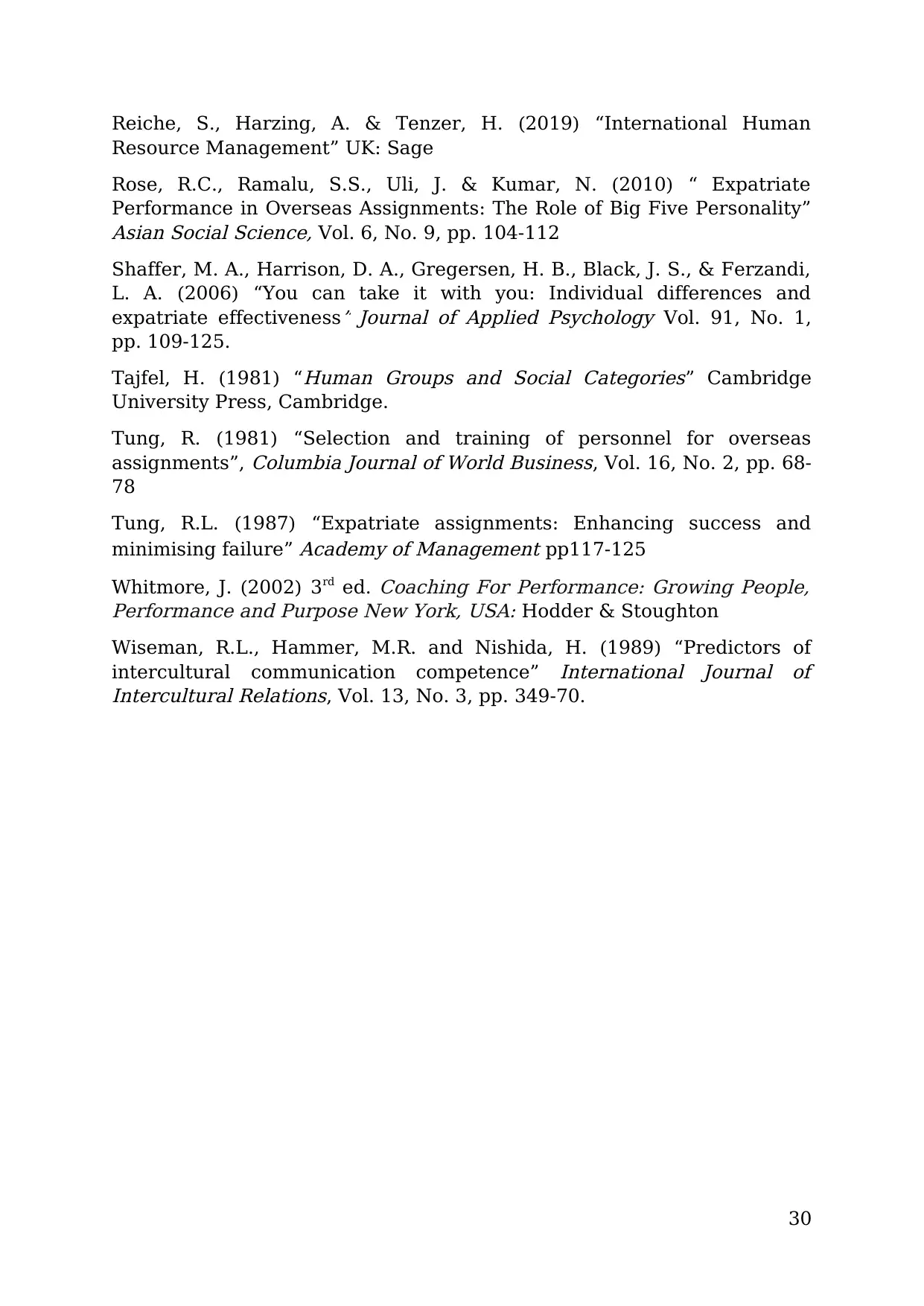
Reiche, S., Harzing, A. & Tenzer, H. (2019) “International Human
Resource Management” UK: Sage
Rose, R.C., Ramalu, S.S., Uli, J. & Kumar, N. (2010) “ Expatriate
Performance in Overseas Assignments: The Role of Big Five Personality”Asian Social Science, Vol. 6, No. 9, pp. 104-112
Shaffer, M. A., Harrison, D. A., Gregersen, H. B., Black, J. S., & Ferzandi,
L. A. (2006) “You can take it with you: Individual differences and
expatriate effectiveness
” Journal of Applied Psychology Vol. 91, No. 1,
pp. 109-125.
Tajfel, H. (1981) “
Human Groups and Social Categories” Cambridge
University Press, Cambridge.
Tung, R. (1981) “Selection and training of personnel for overseas
assignments”,
Columbia Journal of World Business, Vol. 16, No. 2, pp. 68-
78
Tung, R.L. (1987) “Expatriate assignments: Enhancing success and
minimising failure”
Academy of Management pp117-125
Whitmore, J. (2002) 3rd ed.
Coaching For Performance: Growing People,
Performance and Purpose New York, USA: Hodder & Stoughton
Wiseman, R.L., Hammer, M.R. and Nishida, H. (1989) “Predictors of
intercultural communication competence”
International Journal of
Intercultural Relations, Vol. 13, No. 3, pp. 349-70.
30
Resource Management” UK: Sage
Rose, R.C., Ramalu, S.S., Uli, J. & Kumar, N. (2010) “ Expatriate
Performance in Overseas Assignments: The Role of Big Five Personality”Asian Social Science, Vol. 6, No. 9, pp. 104-112
Shaffer, M. A., Harrison, D. A., Gregersen, H. B., Black, J. S., & Ferzandi,
L. A. (2006) “You can take it with you: Individual differences and
expatriate effectiveness
” Journal of Applied Psychology Vol. 91, No. 1,
pp. 109-125.
Tajfel, H. (1981) “
Human Groups and Social Categories” Cambridge
University Press, Cambridge.
Tung, R. (1981) “Selection and training of personnel for overseas
assignments”,
Columbia Journal of World Business, Vol. 16, No. 2, pp. 68-
78
Tung, R.L. (1987) “Expatriate assignments: Enhancing success and
minimising failure”
Academy of Management pp117-125
Whitmore, J. (2002) 3rd ed.
Coaching For Performance: Growing People,
Performance and Purpose New York, USA: Hodder & Stoughton
Wiseman, R.L., Hammer, M.R. and Nishida, H. (1989) “Predictors of
intercultural communication competence”
International Journal of
Intercultural Relations, Vol. 13, No. 3, pp. 349-70.
30
1 out of 31
Your All-in-One AI-Powered Toolkit for Academic Success.
+13062052269
info@desklib.com
Available 24*7 on WhatsApp / Email
![[object Object]](/_next/static/media/star-bottom.7253800d.svg)
Unlock your academic potential
© 2024 | Zucol Services PVT LTD | All rights reserved.